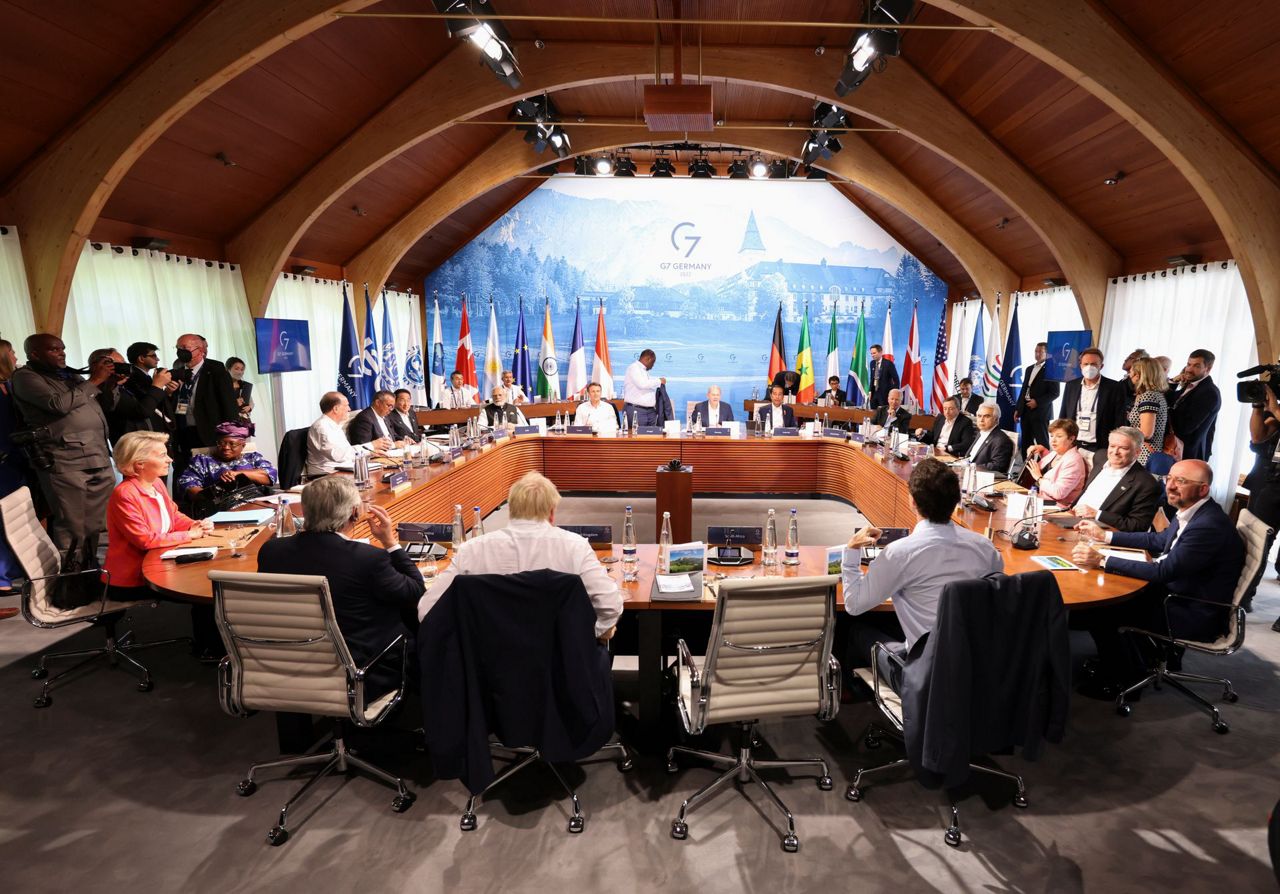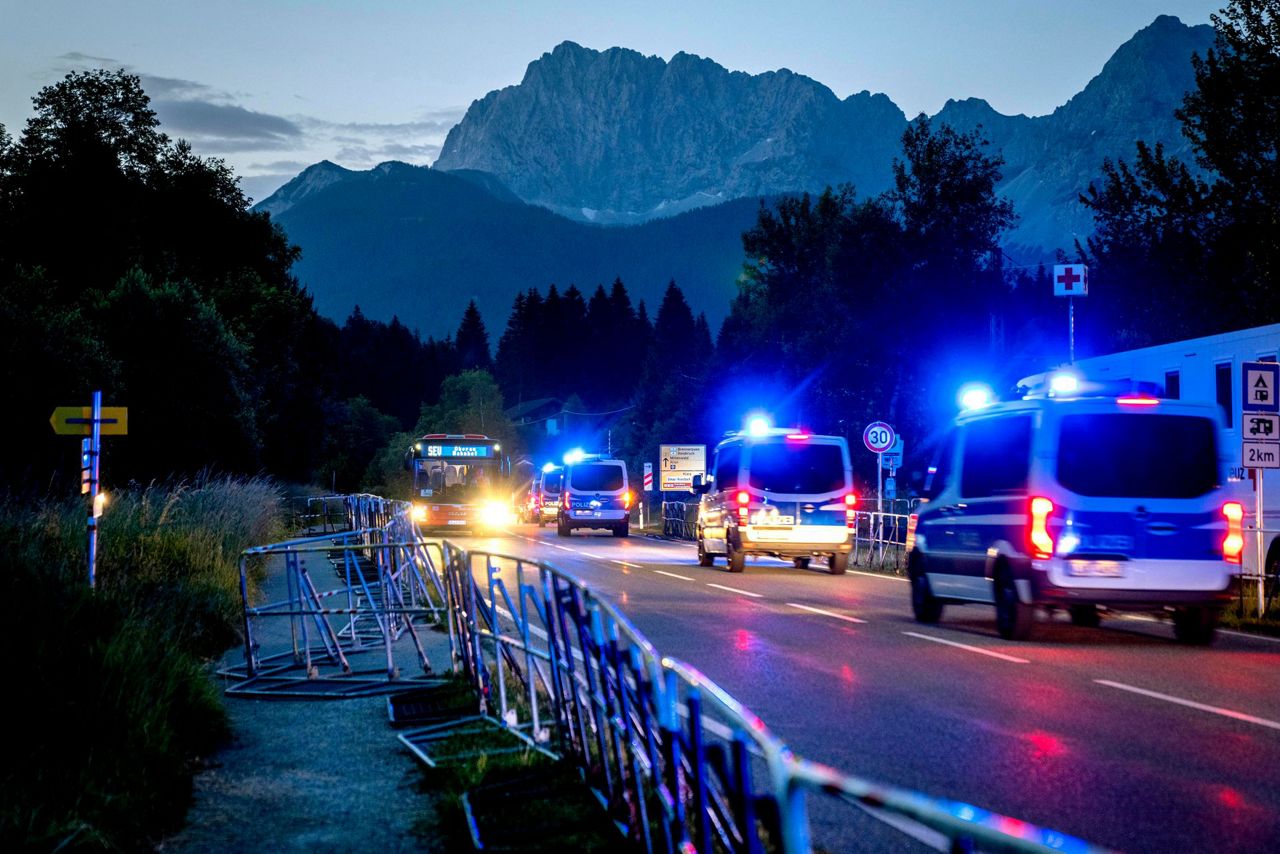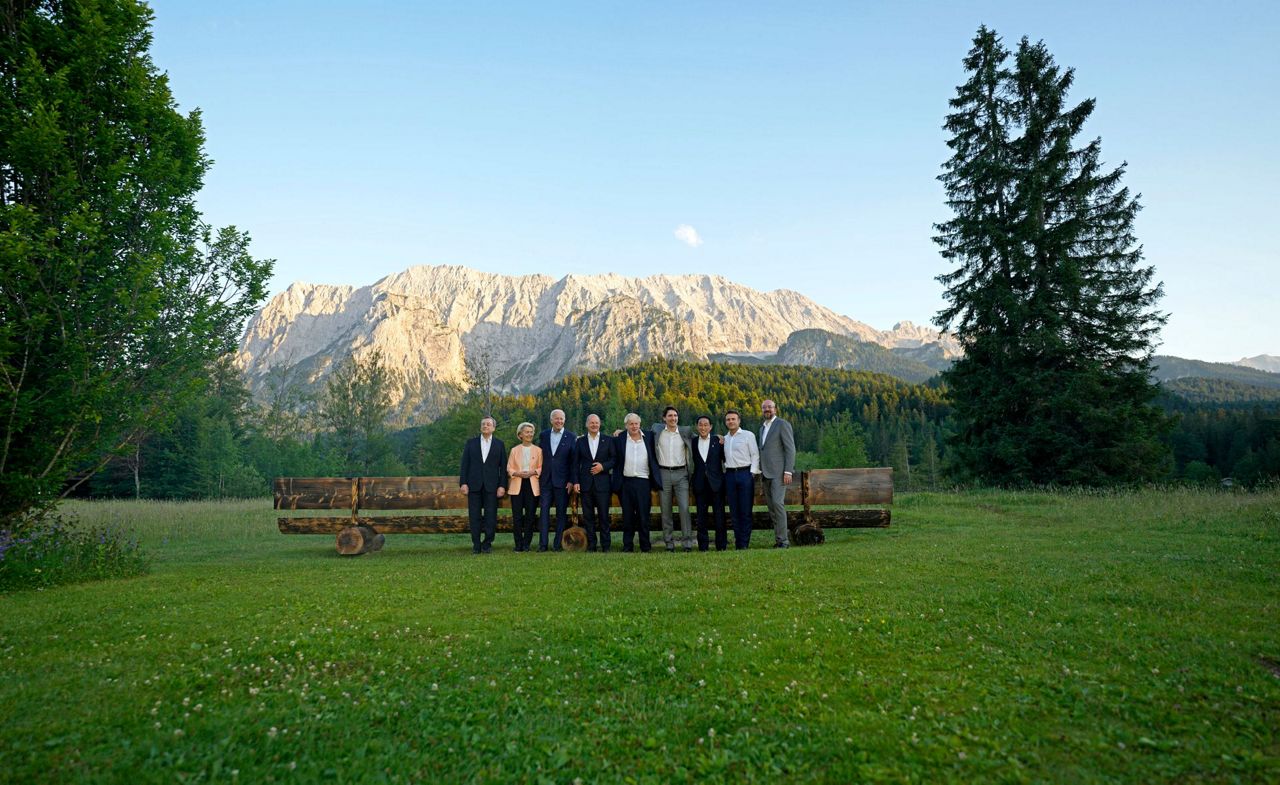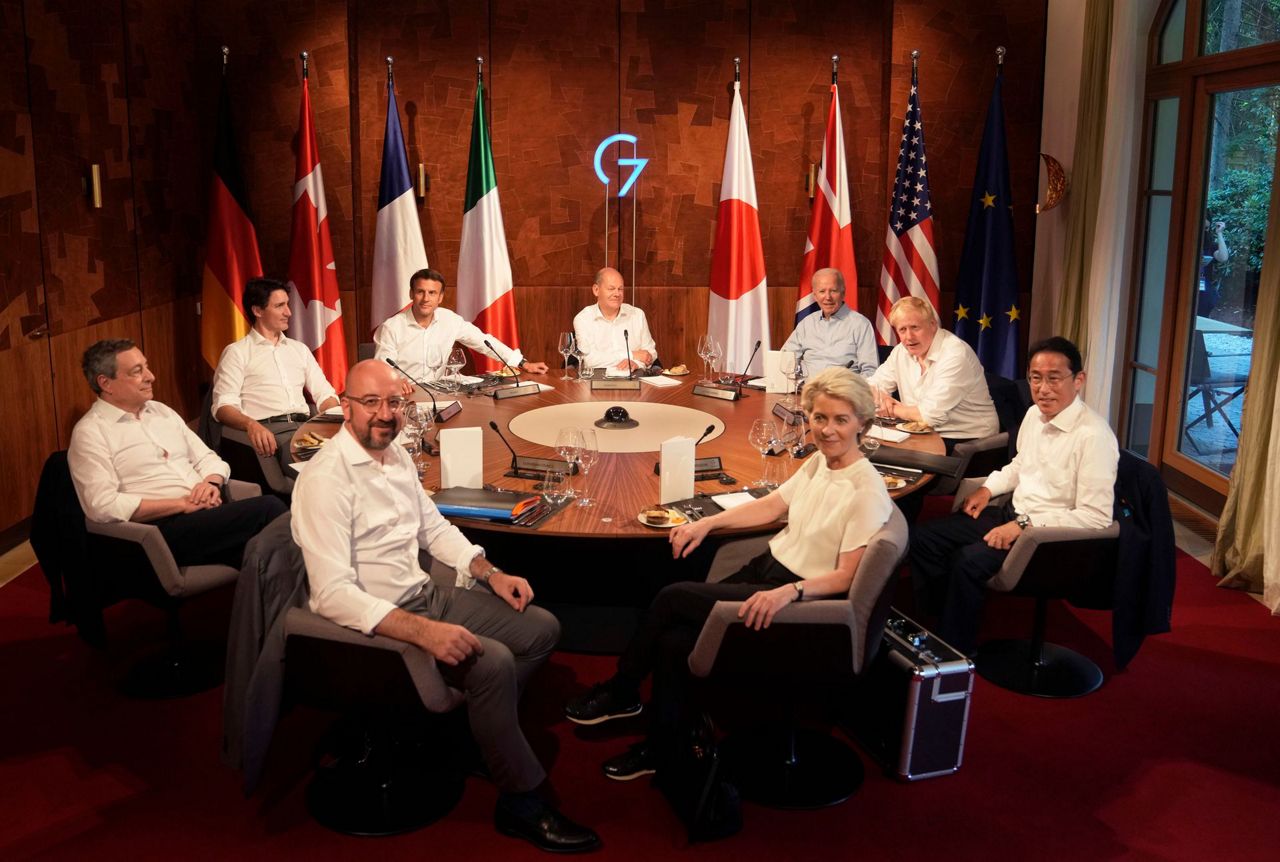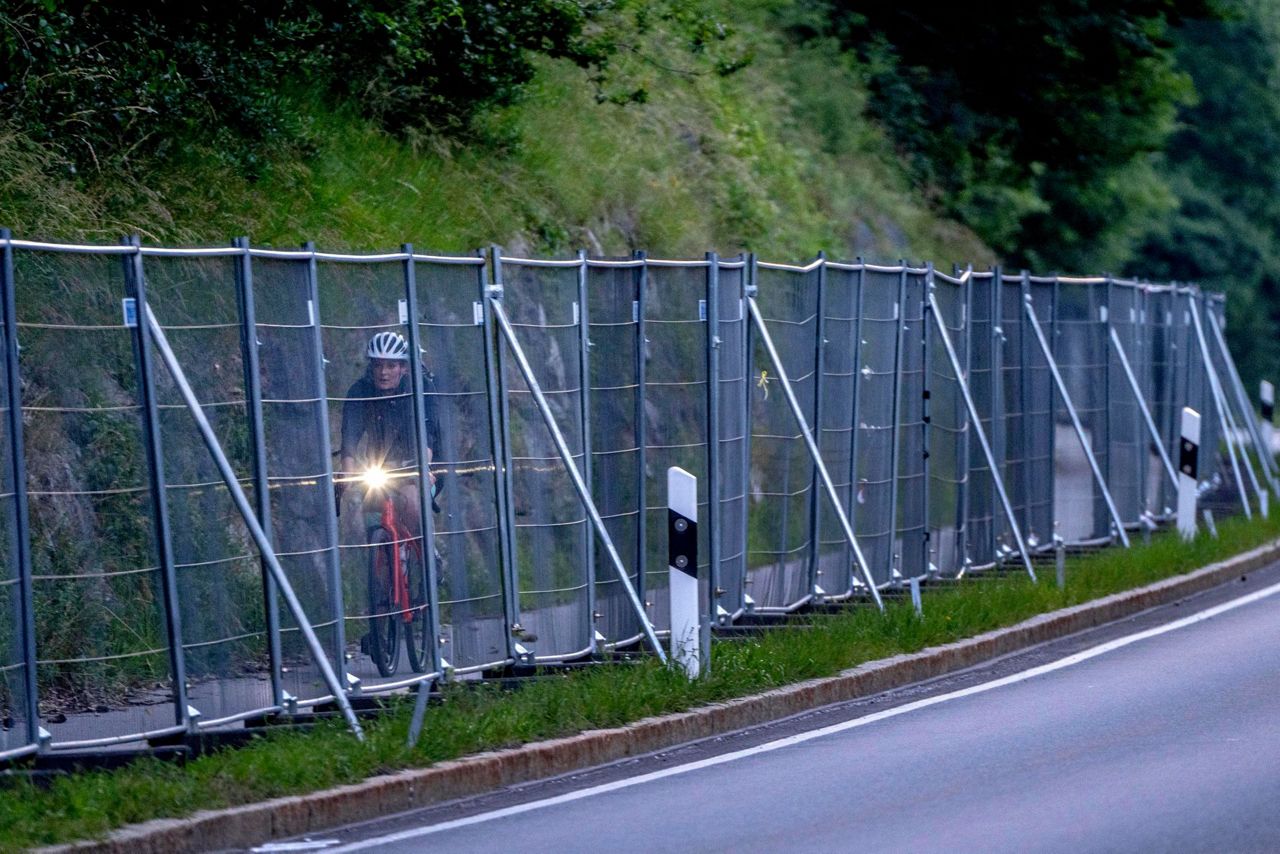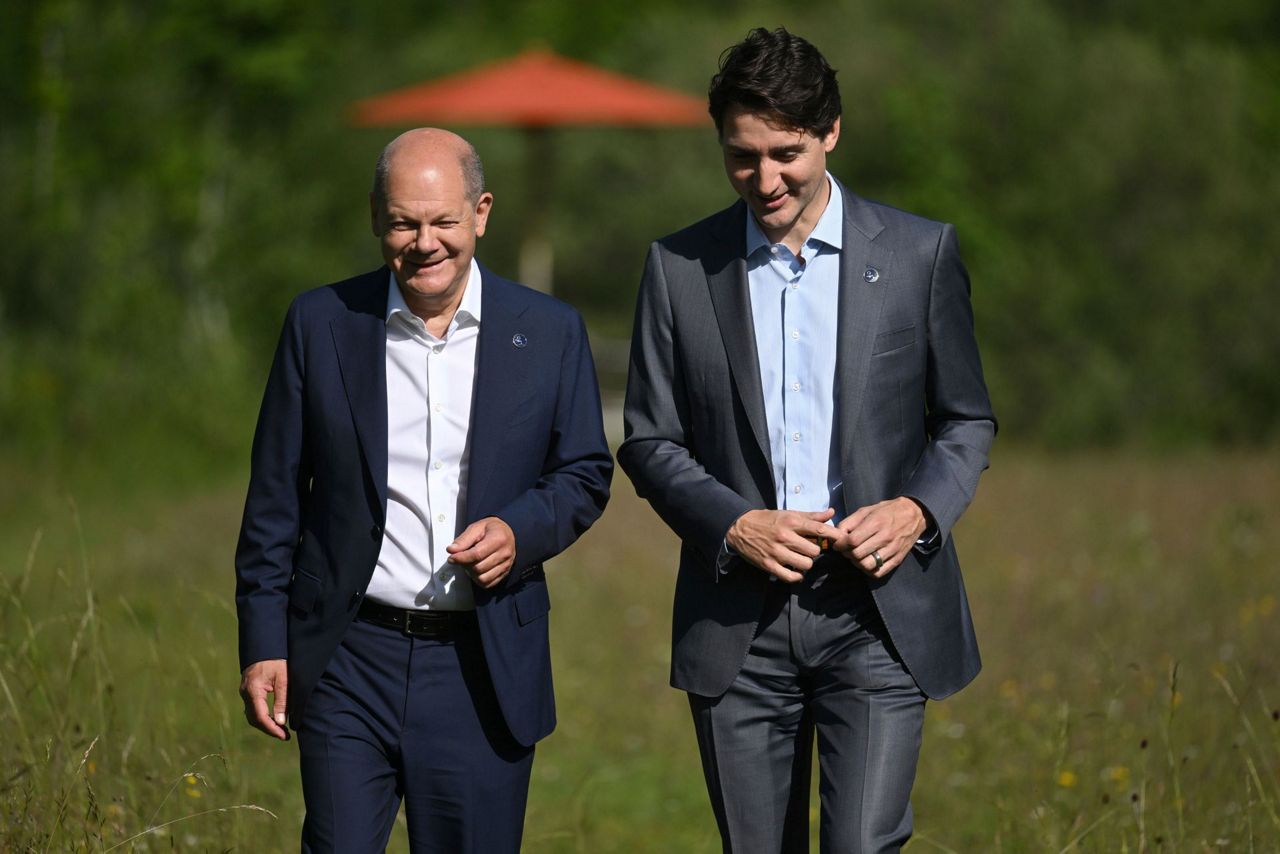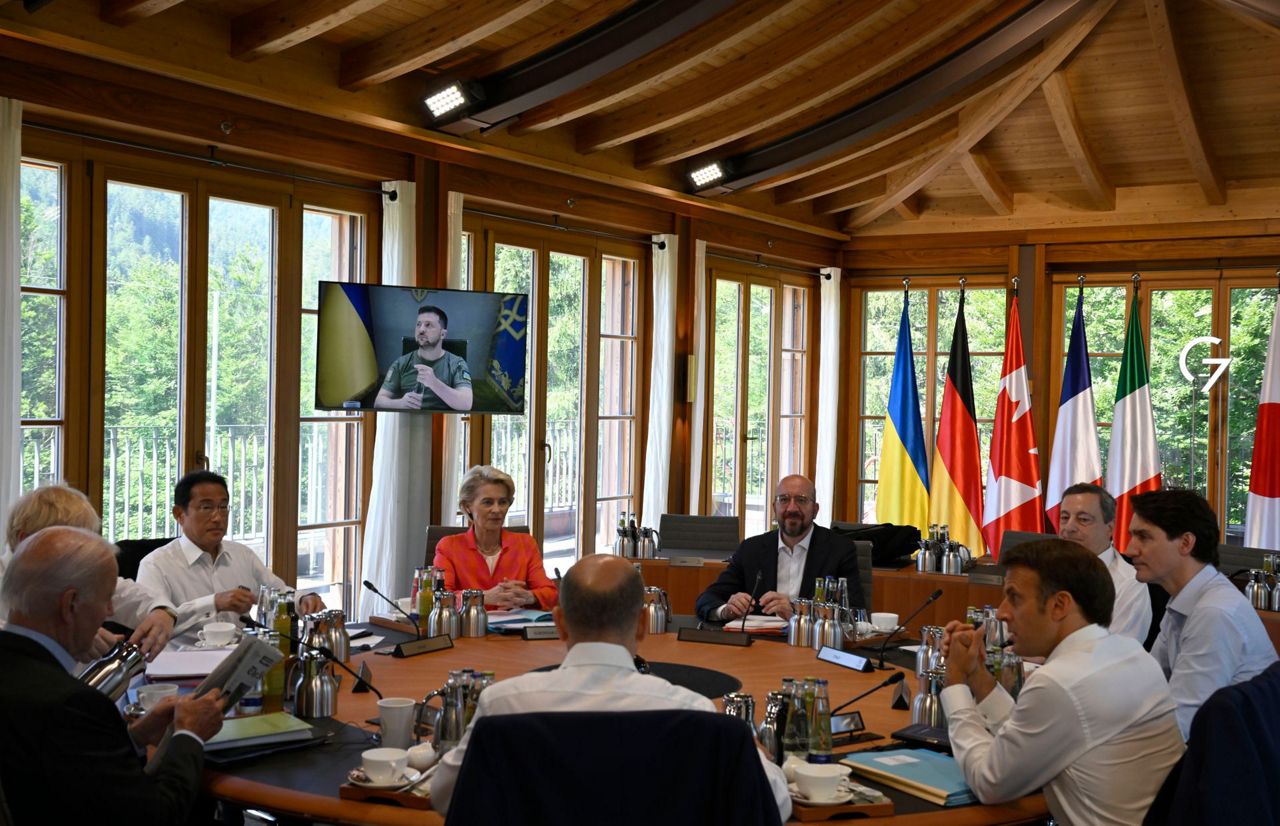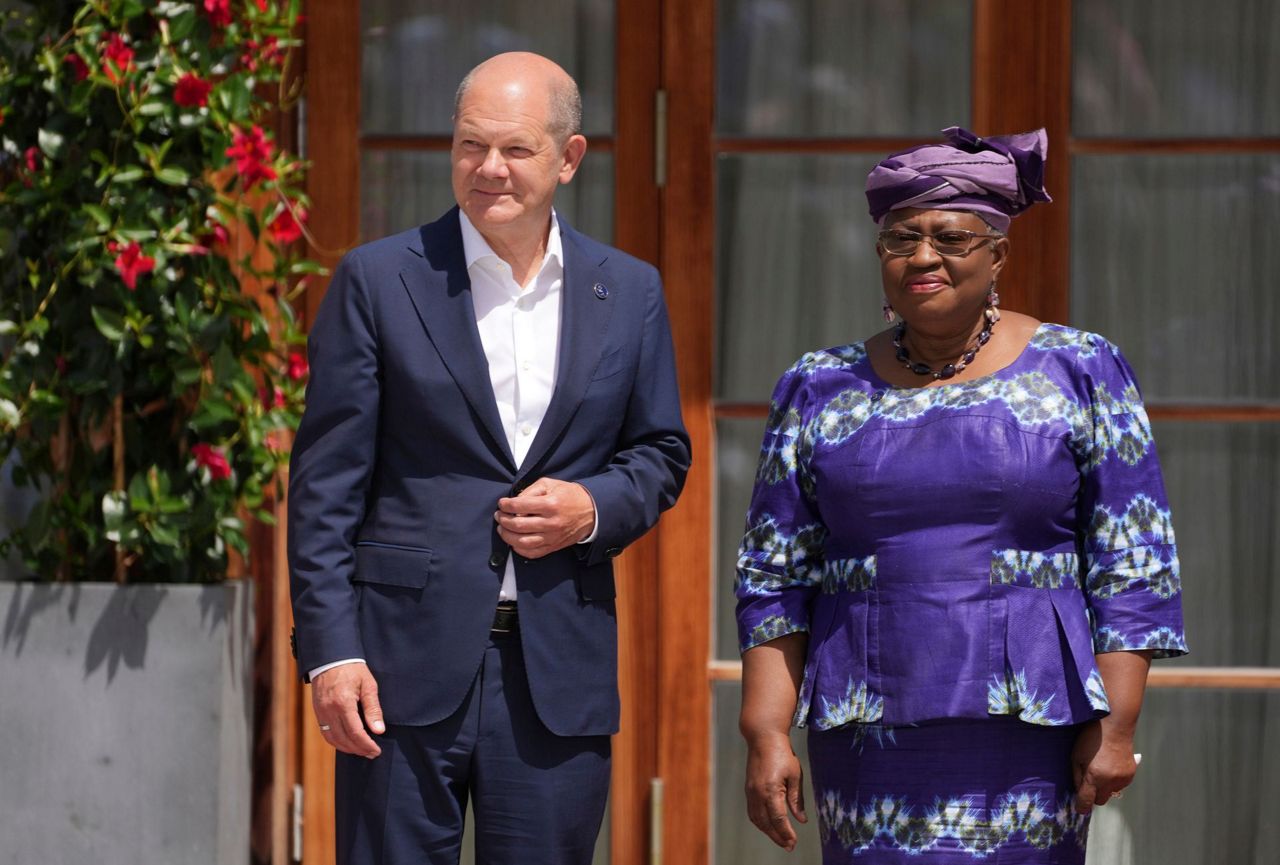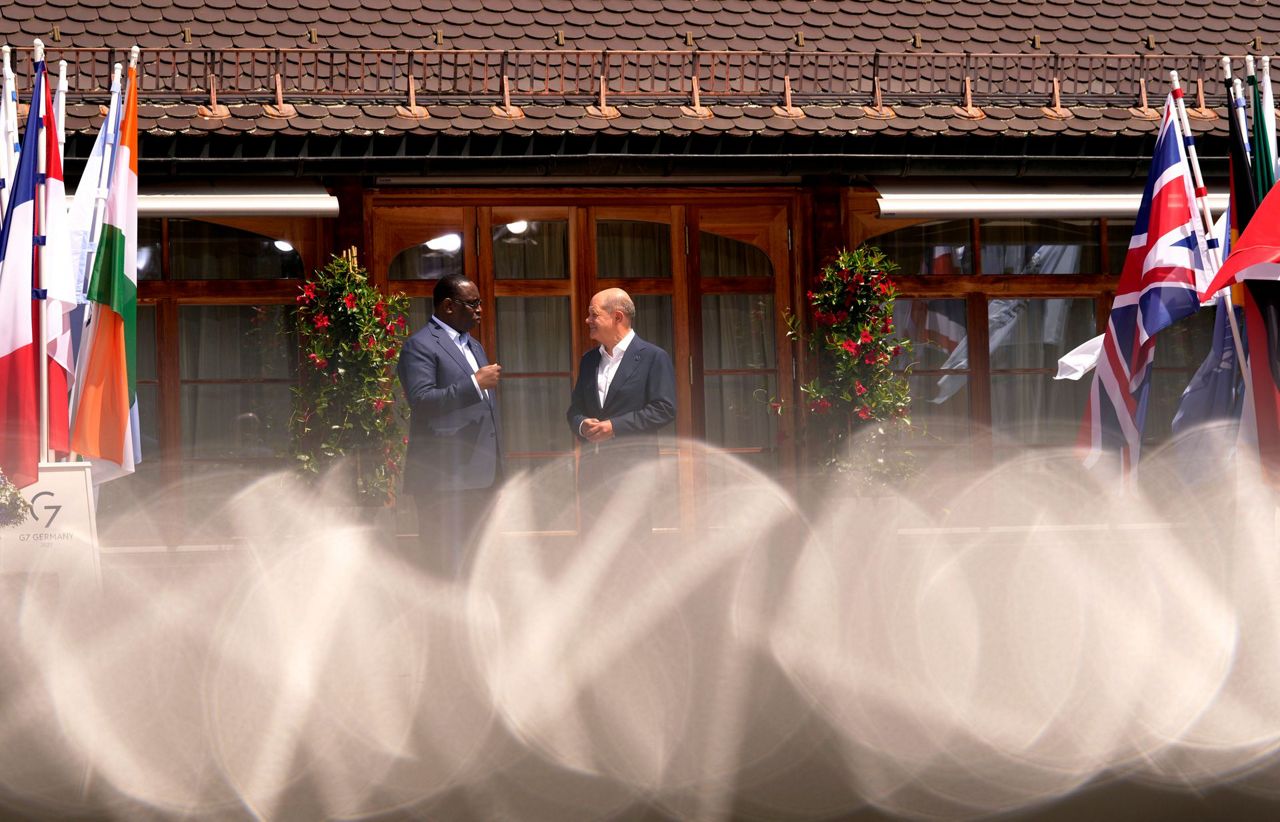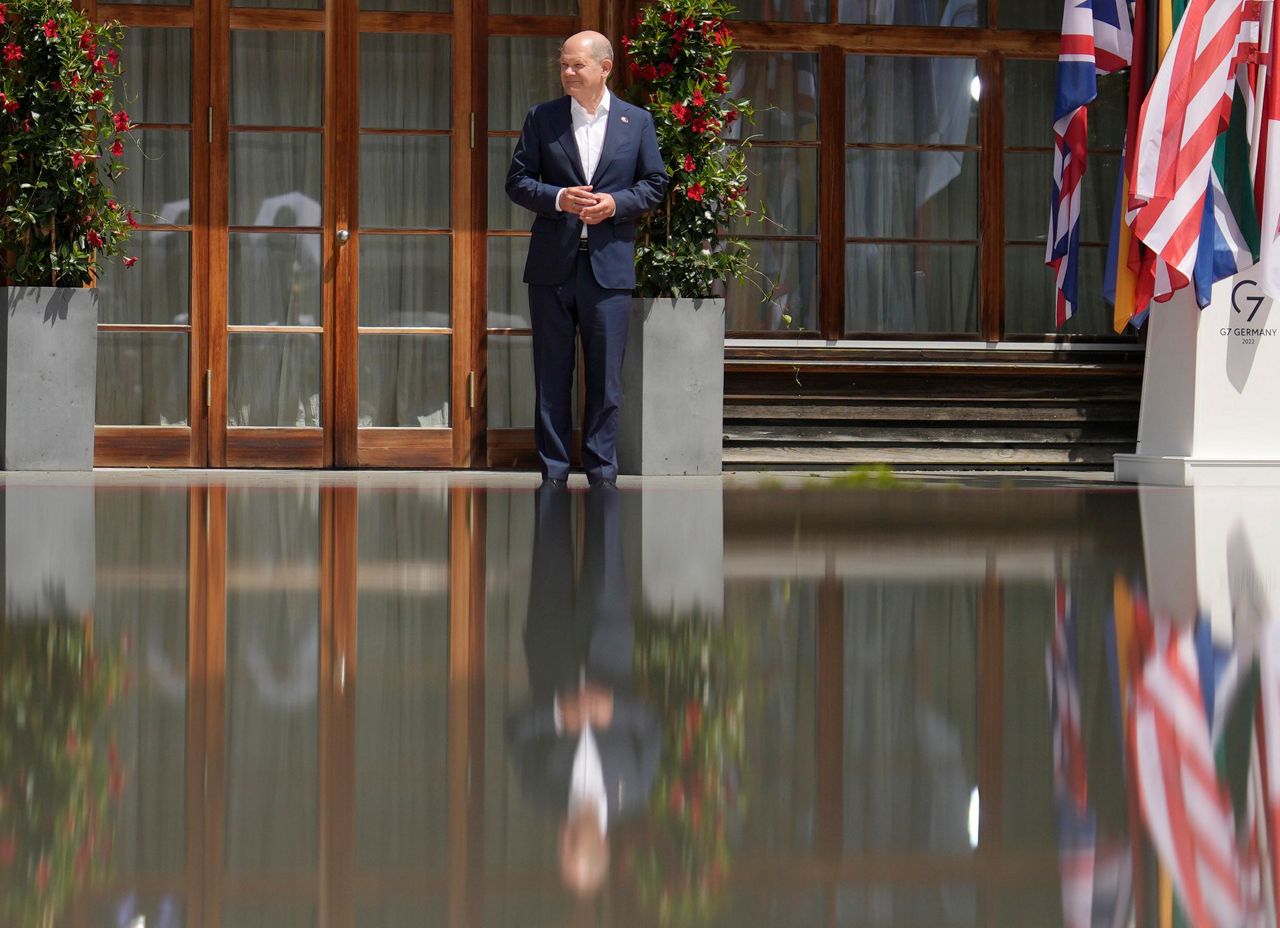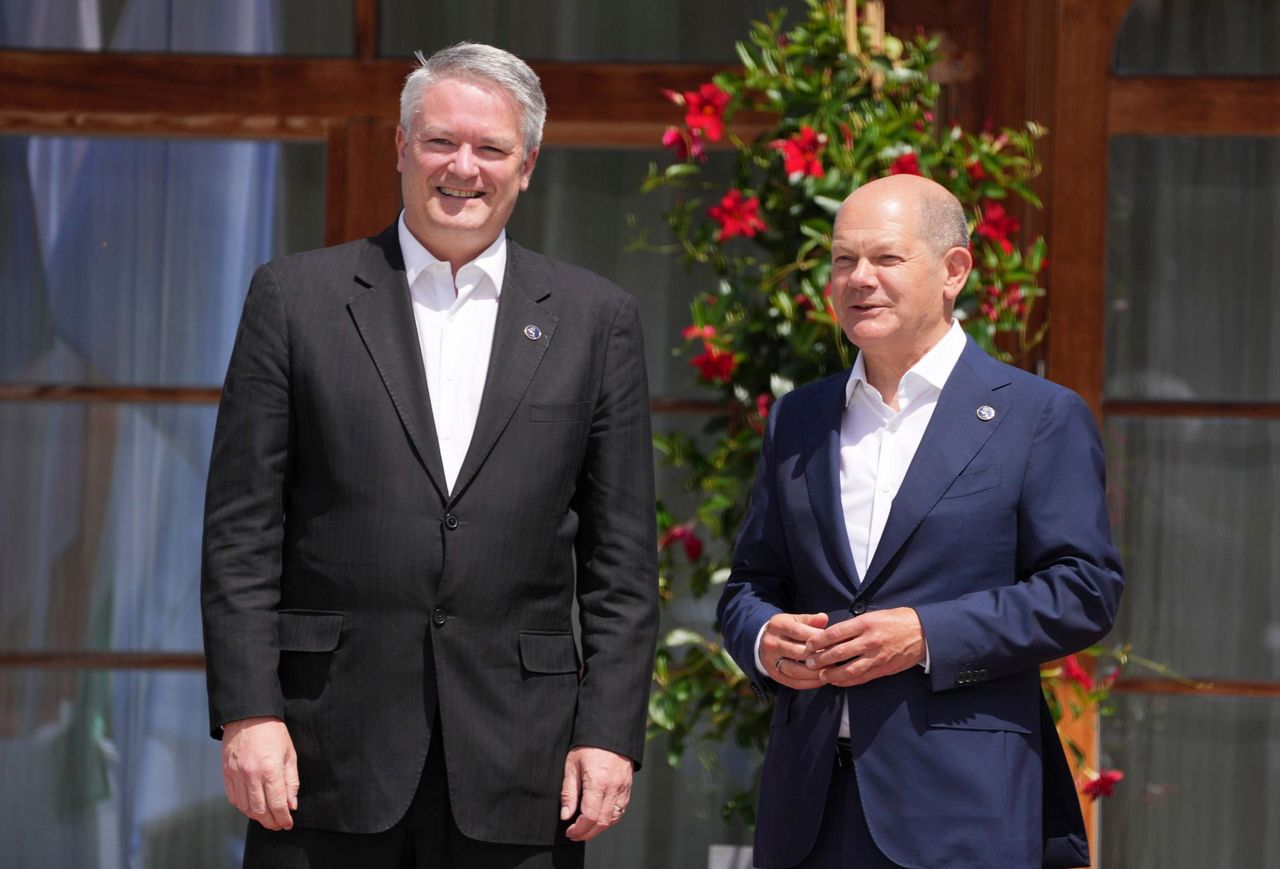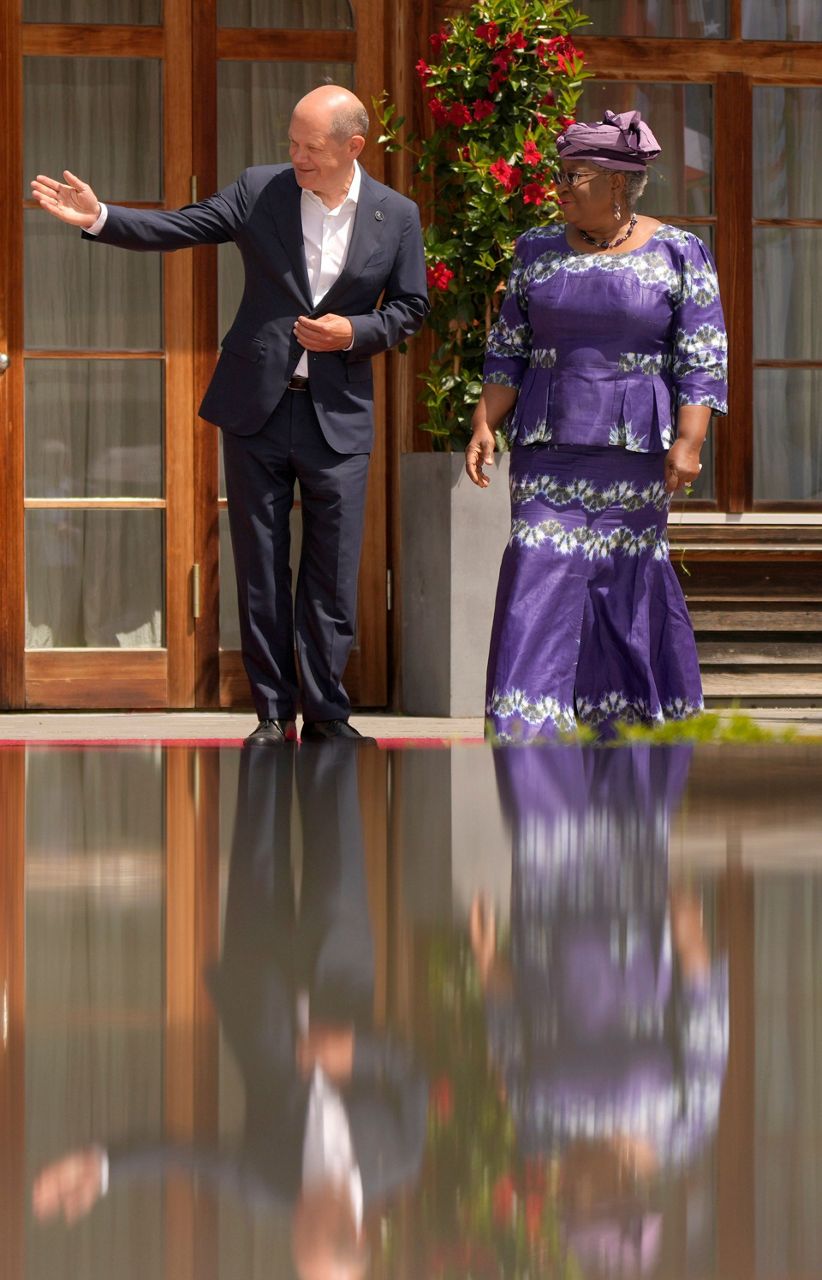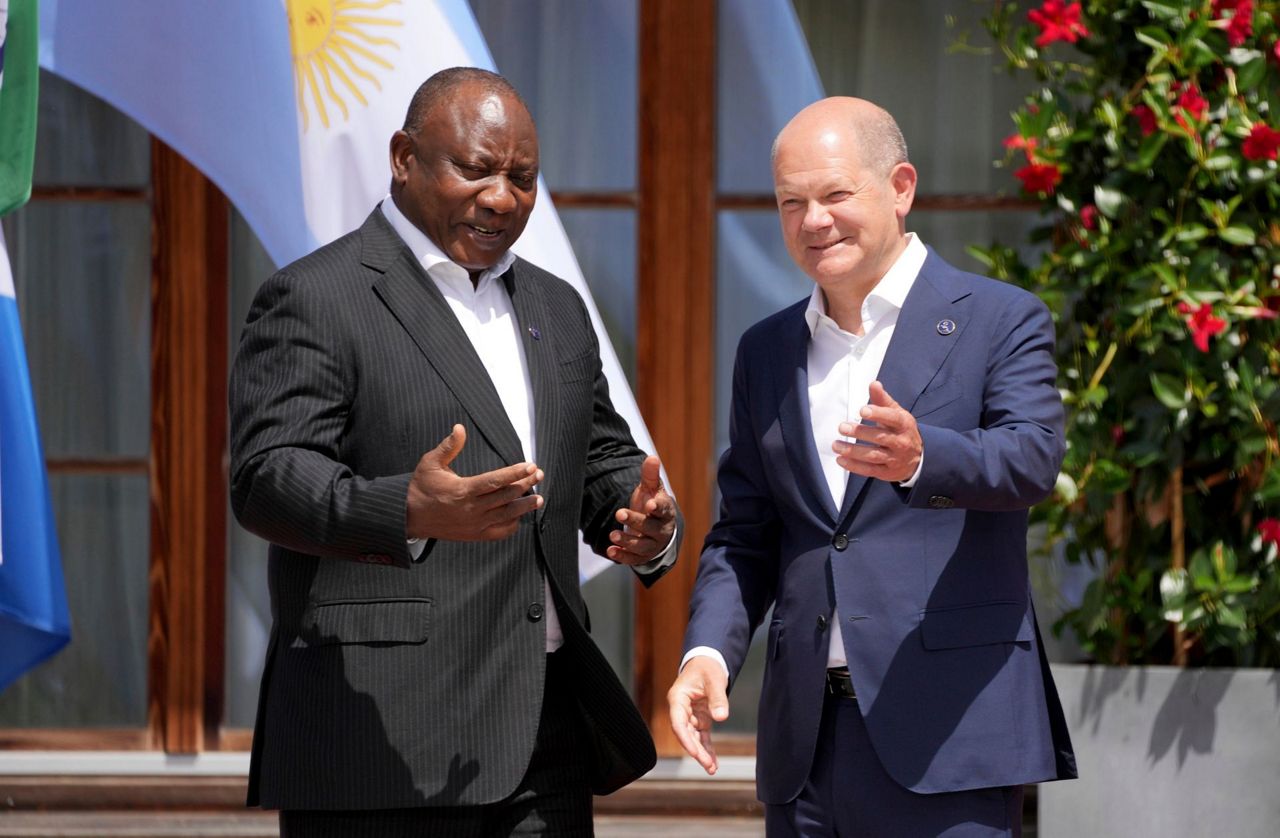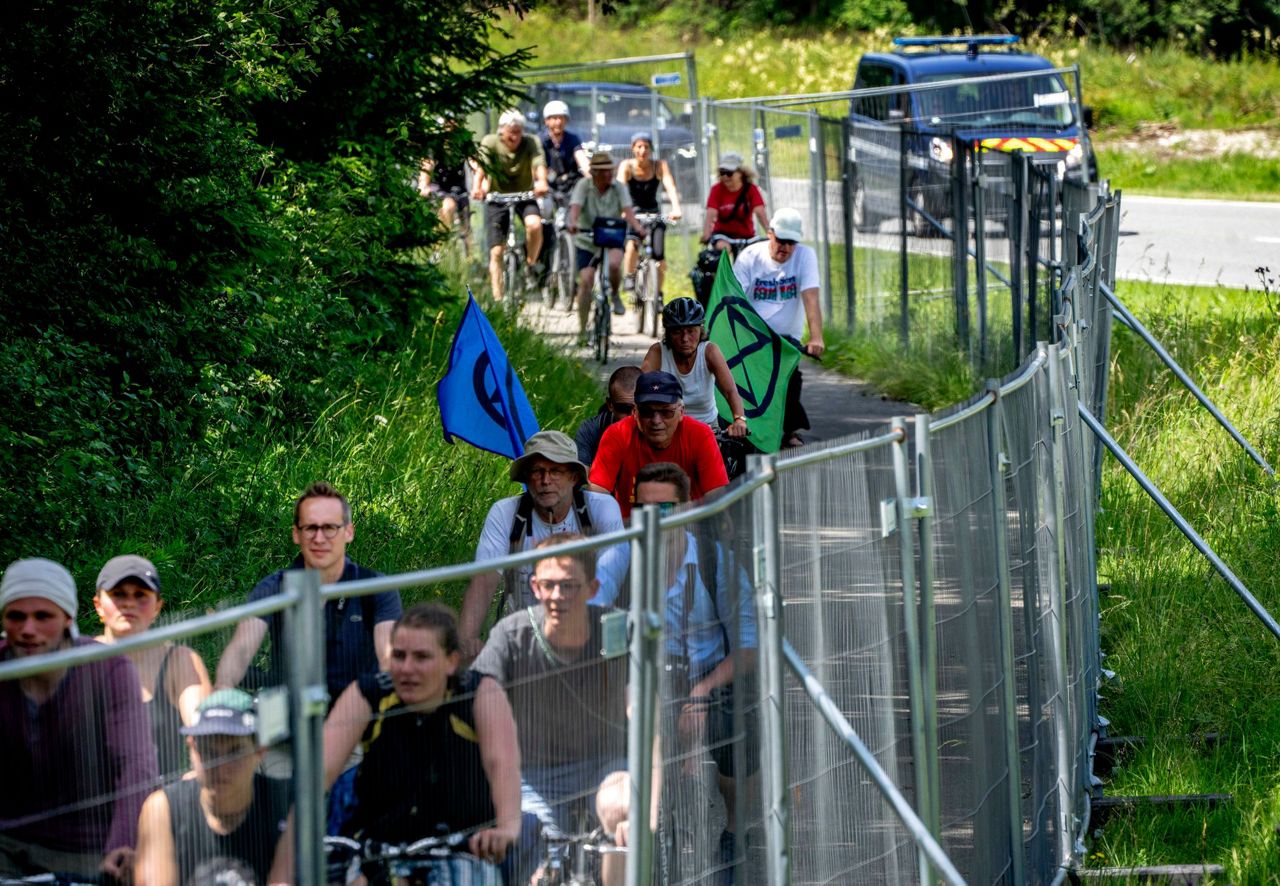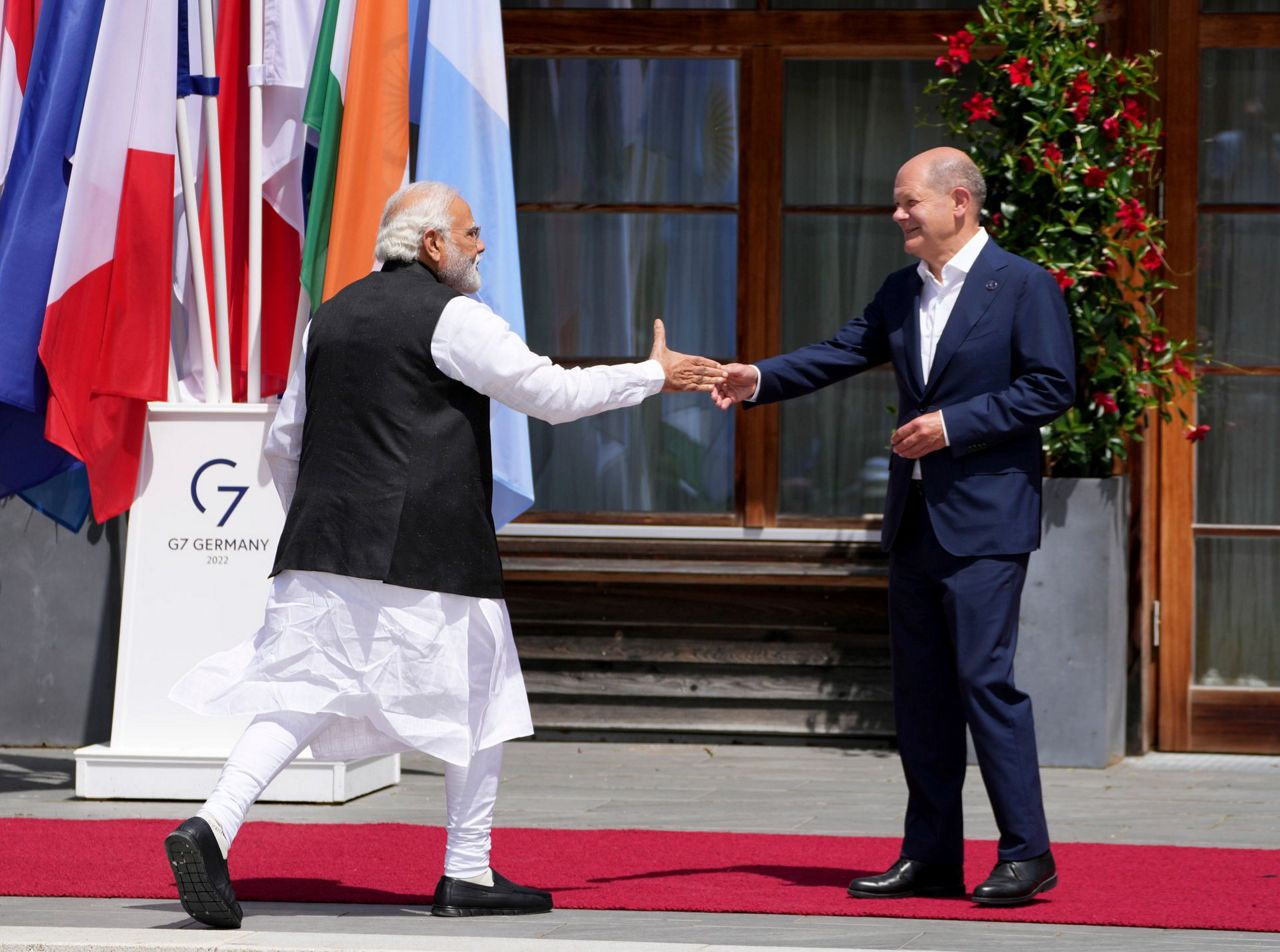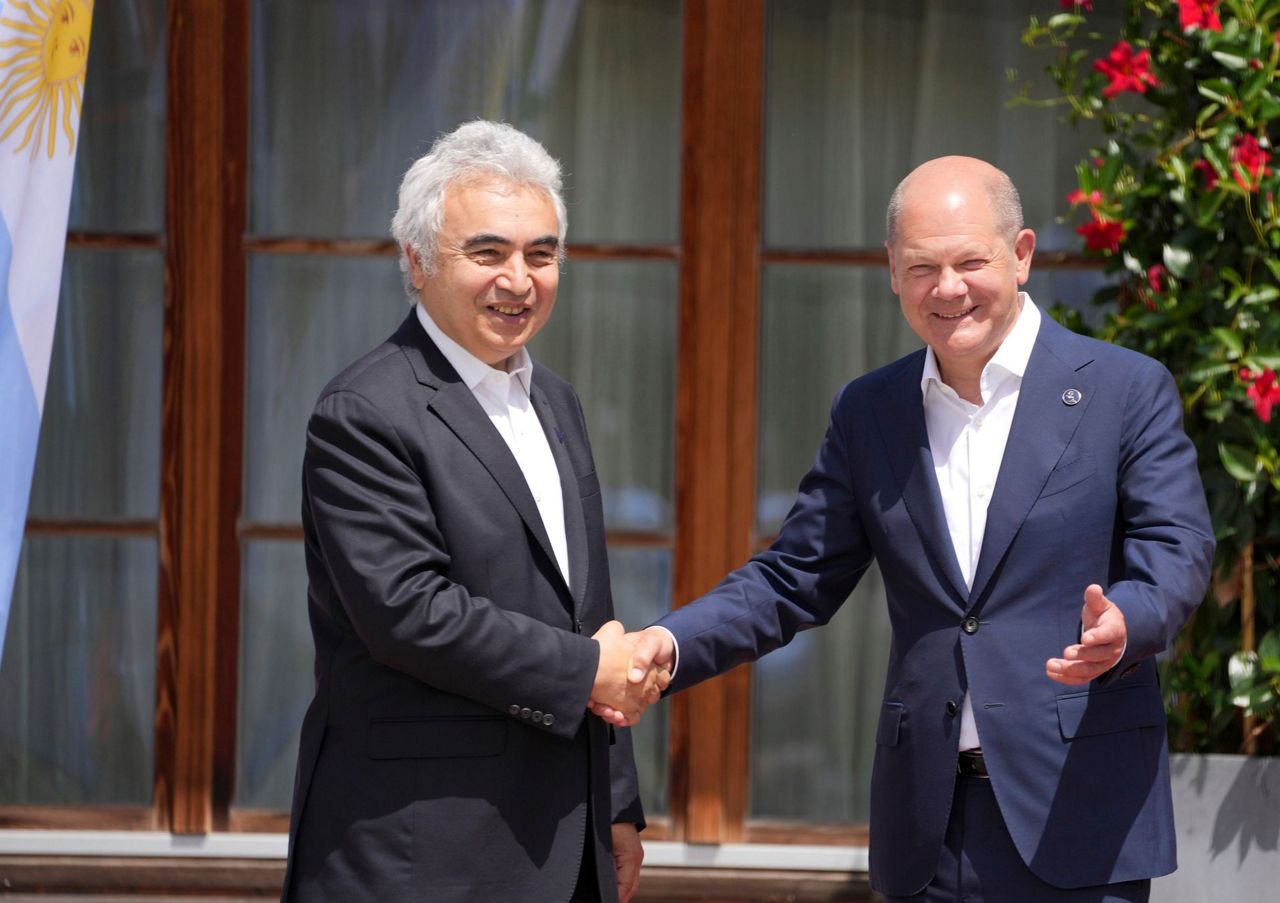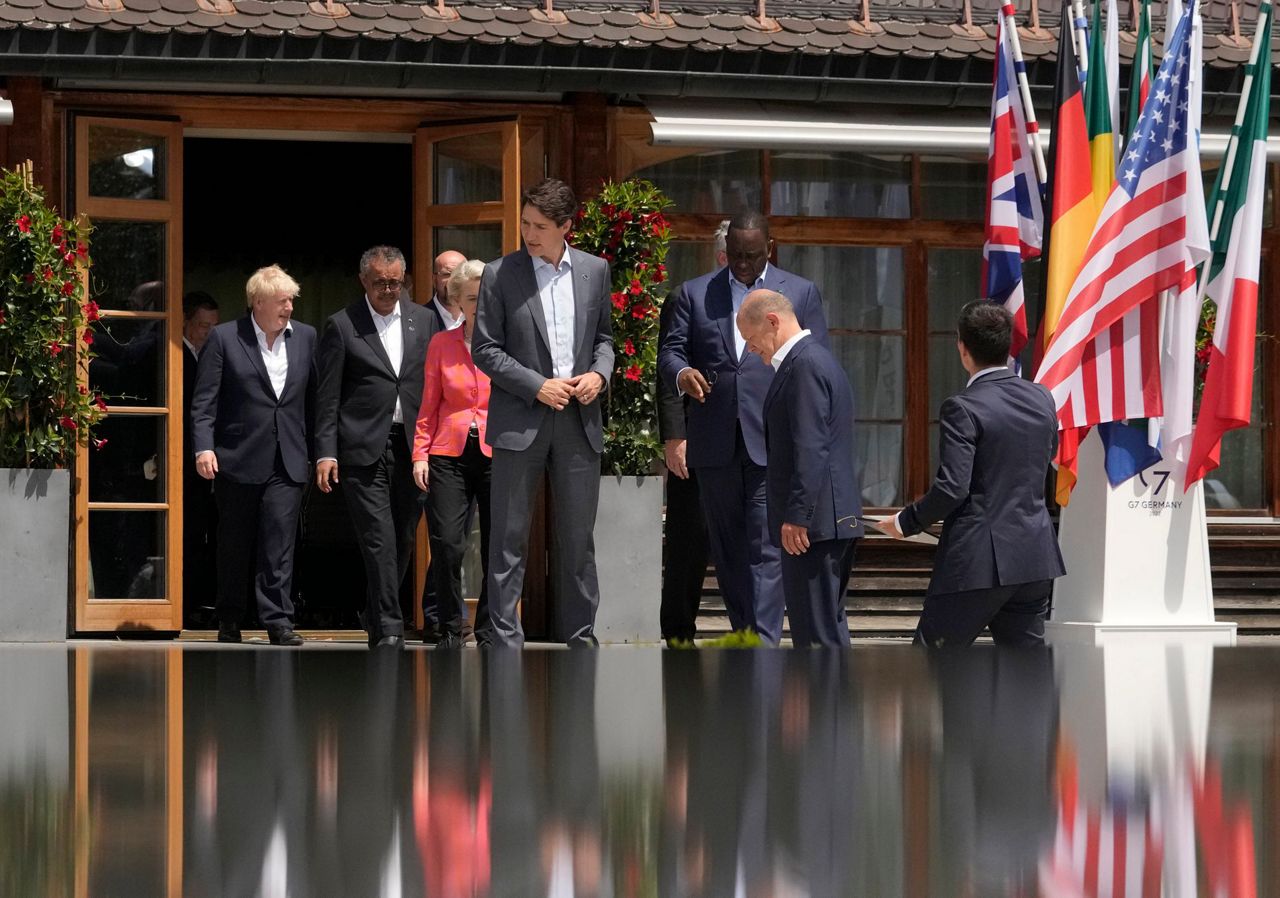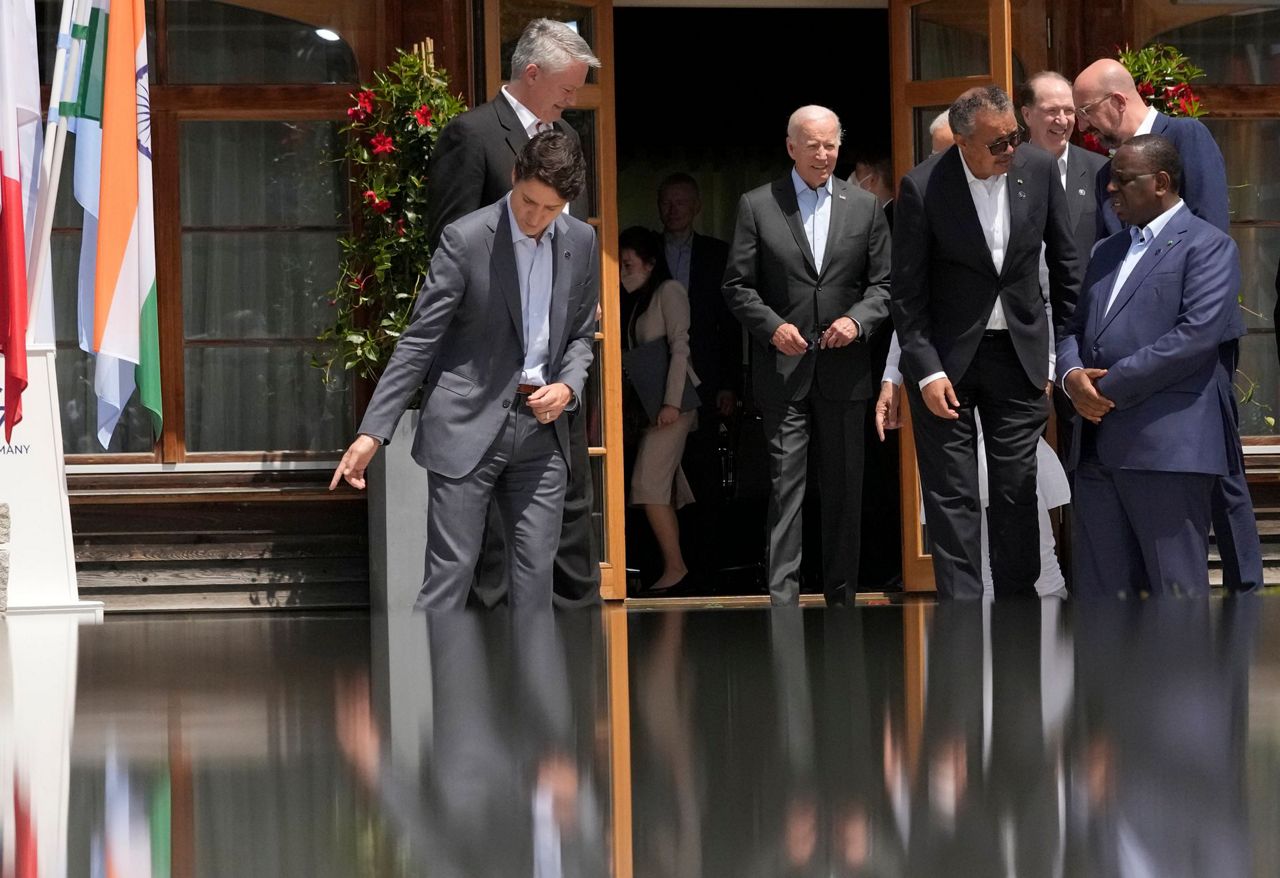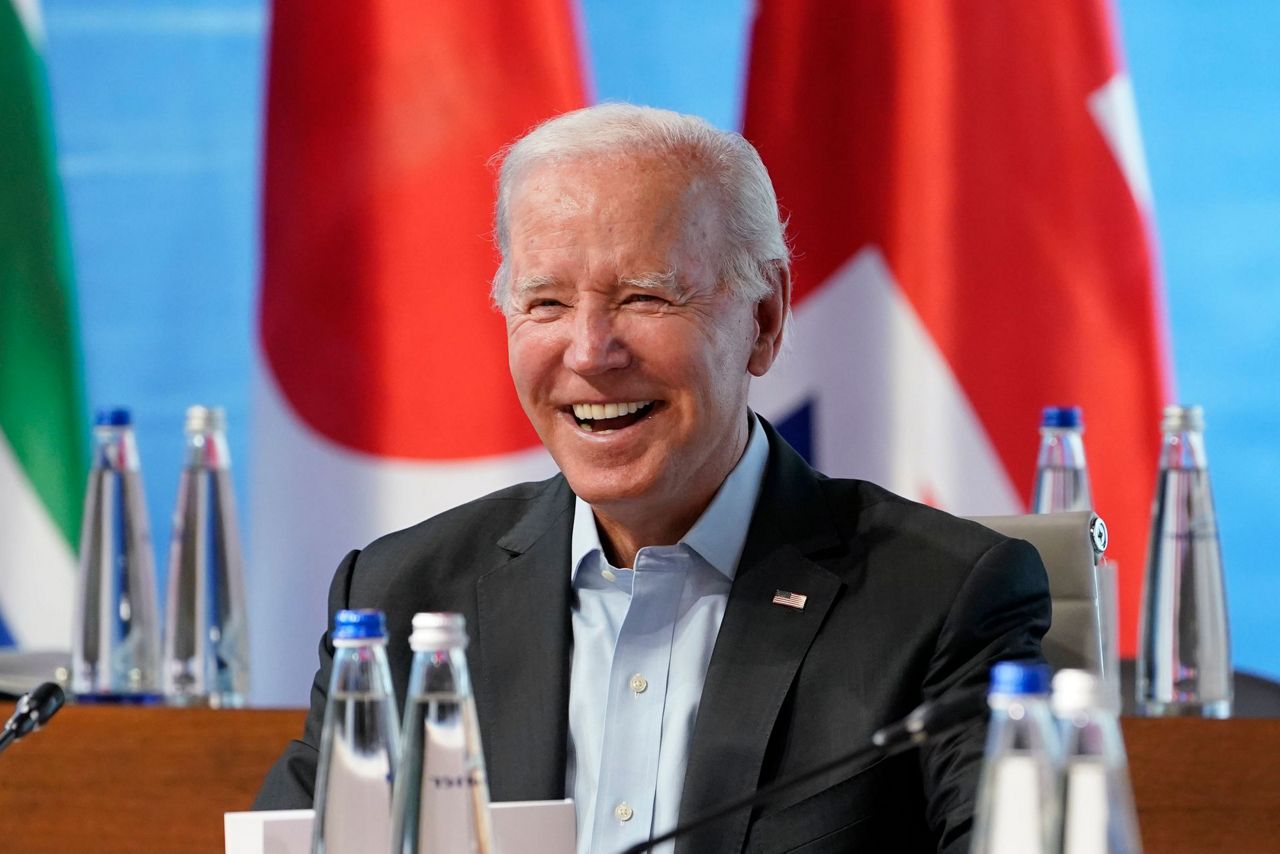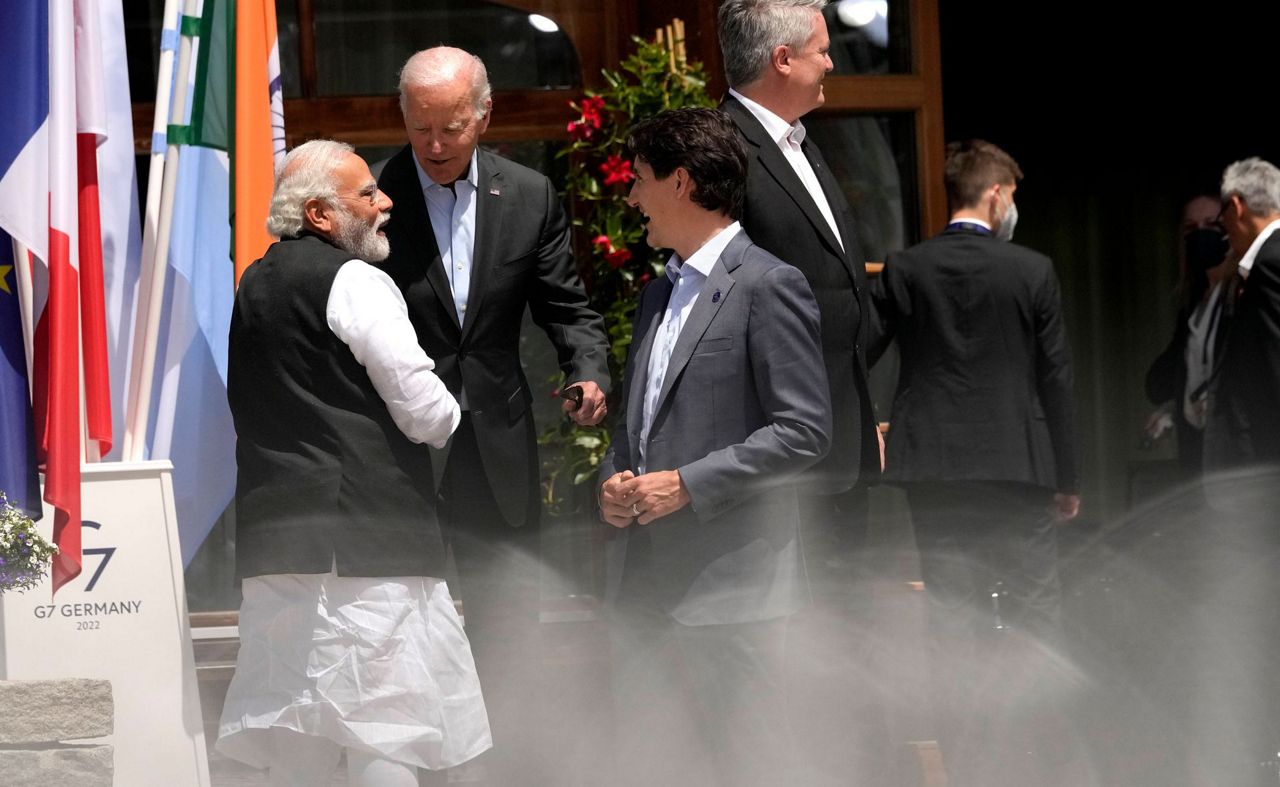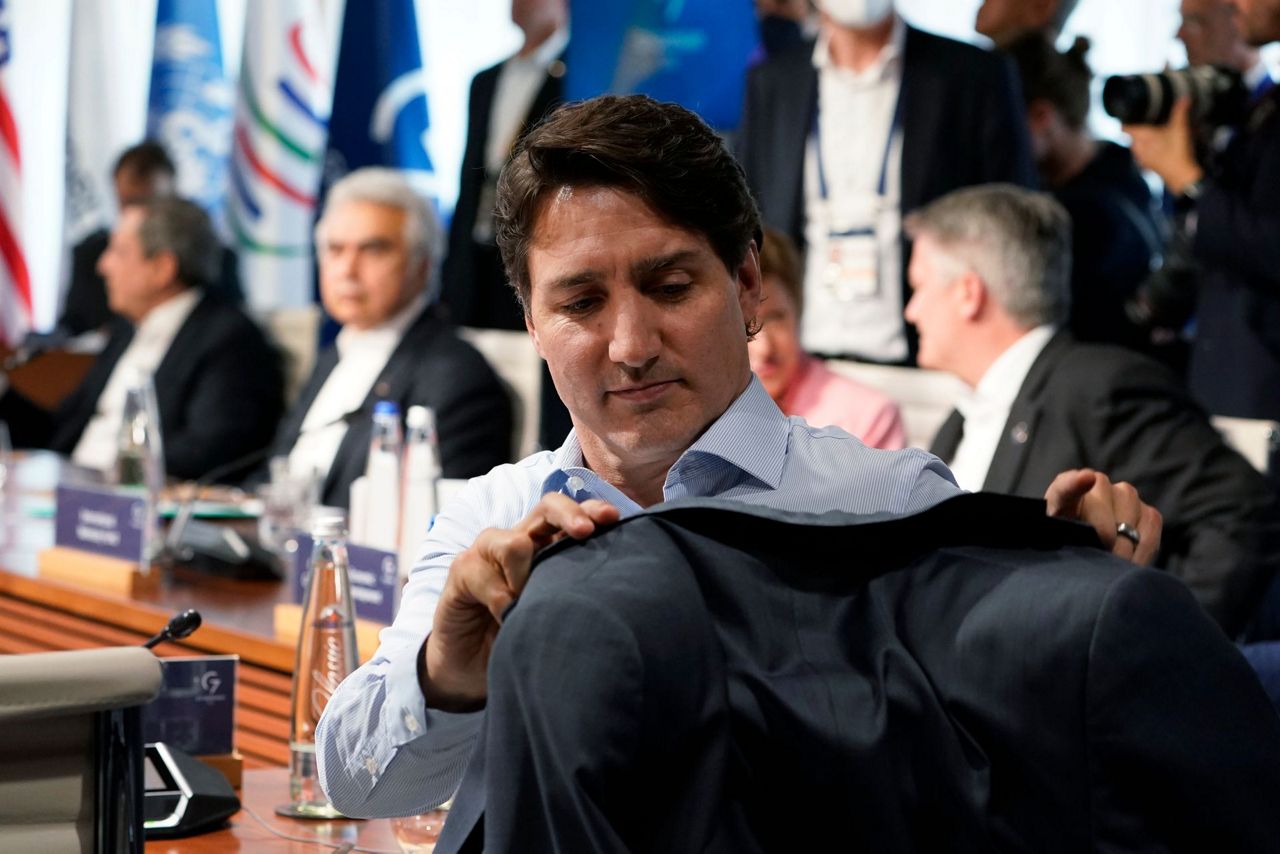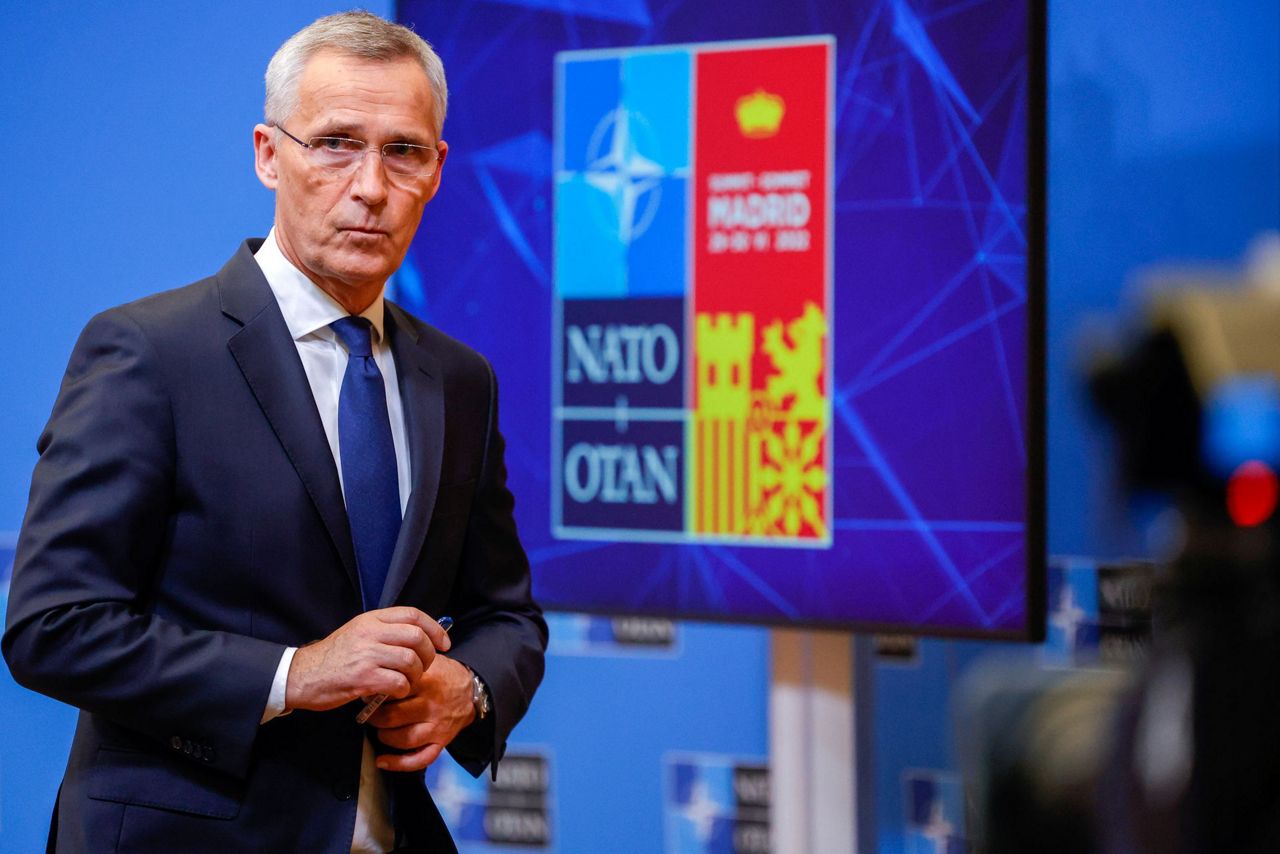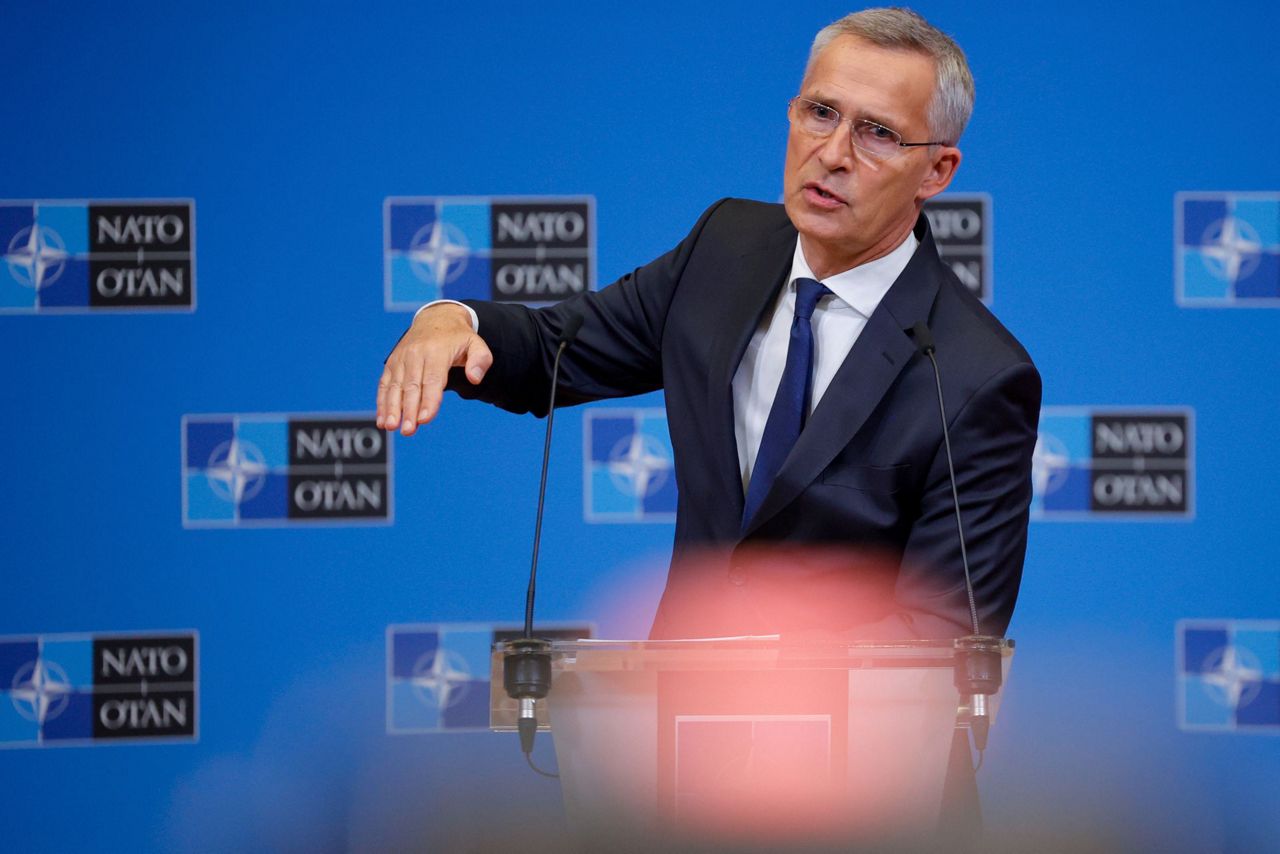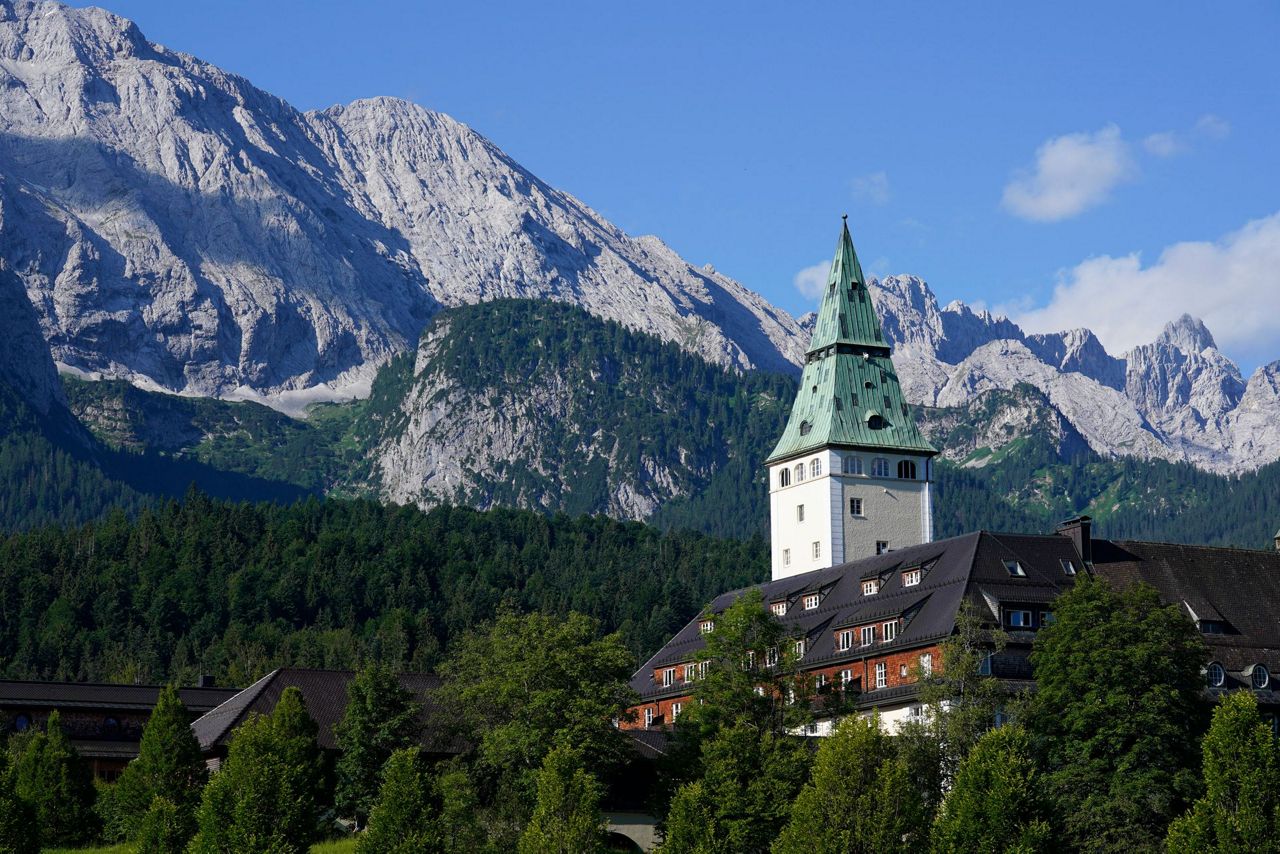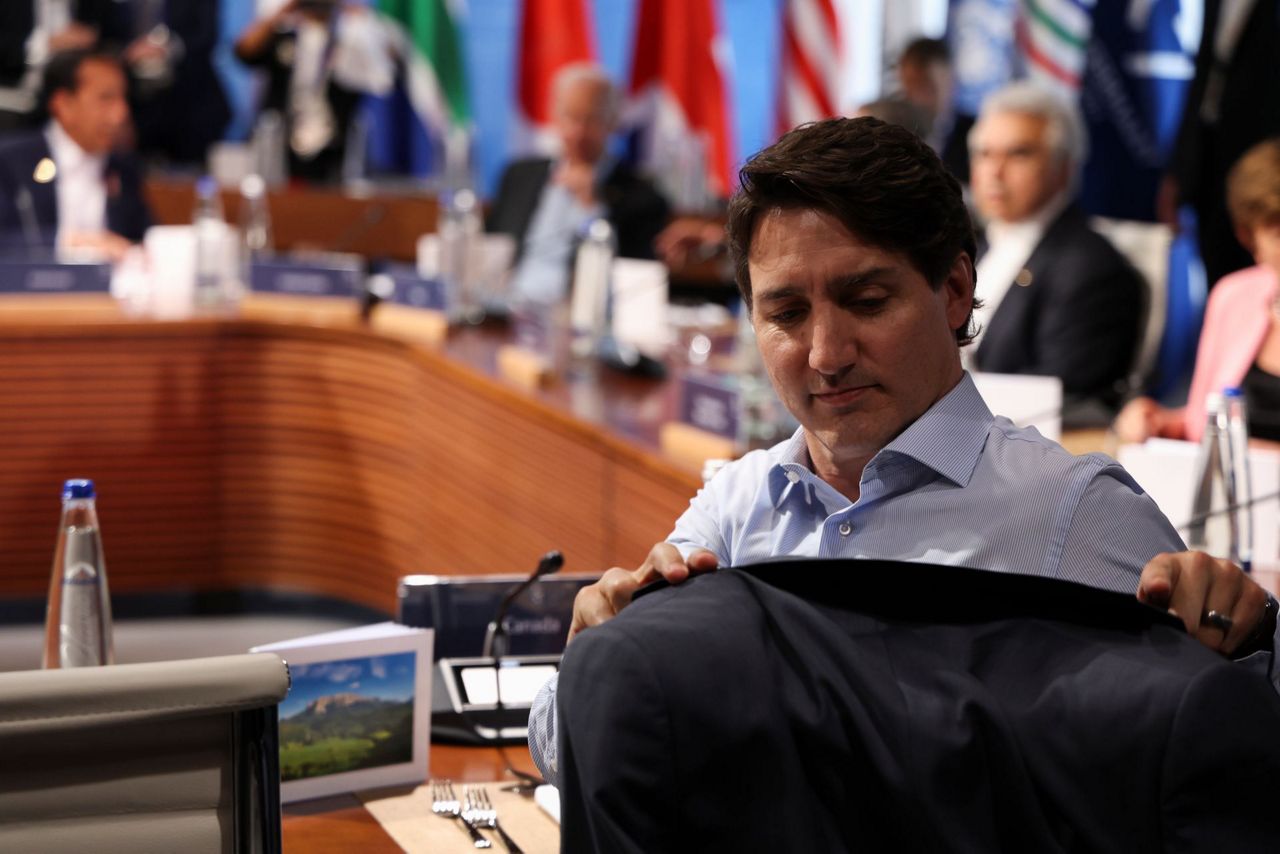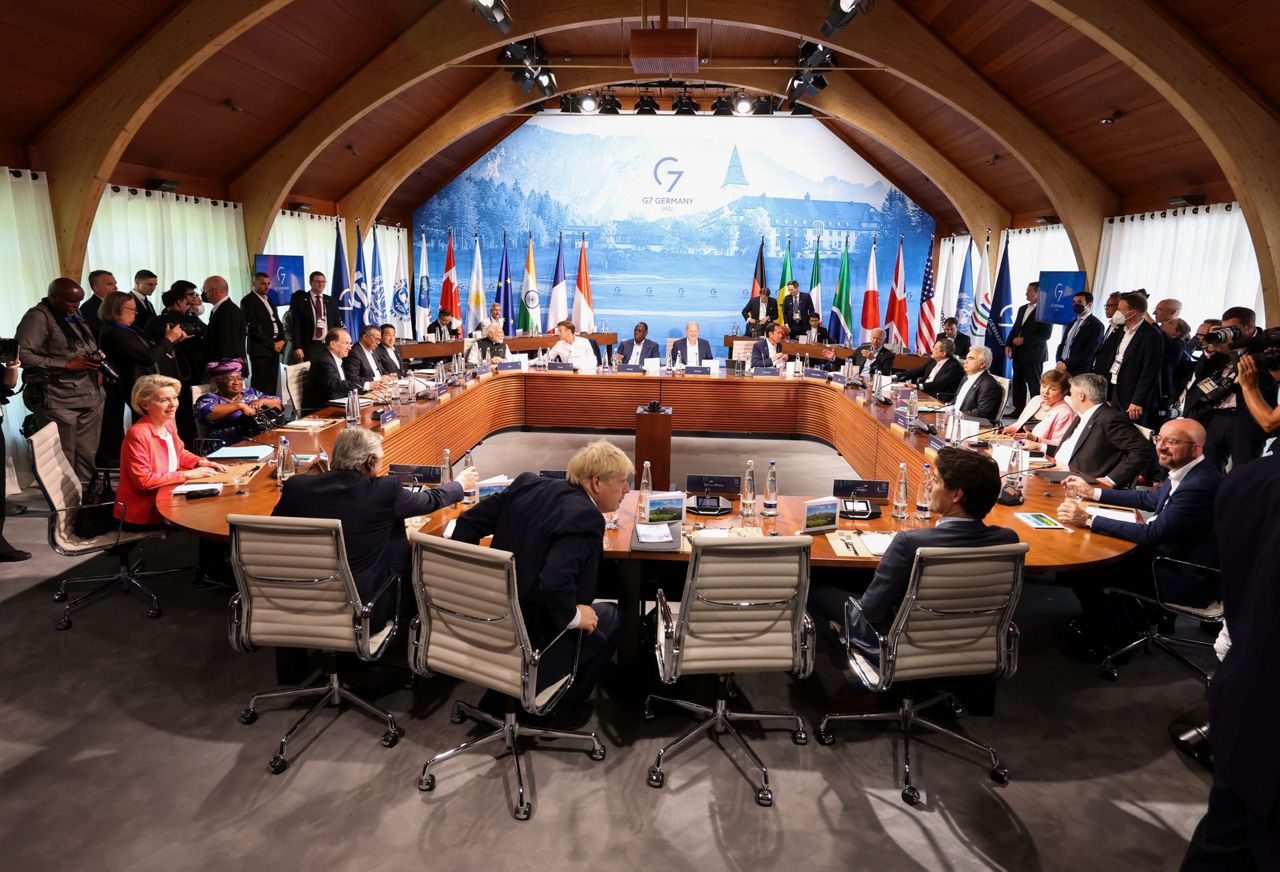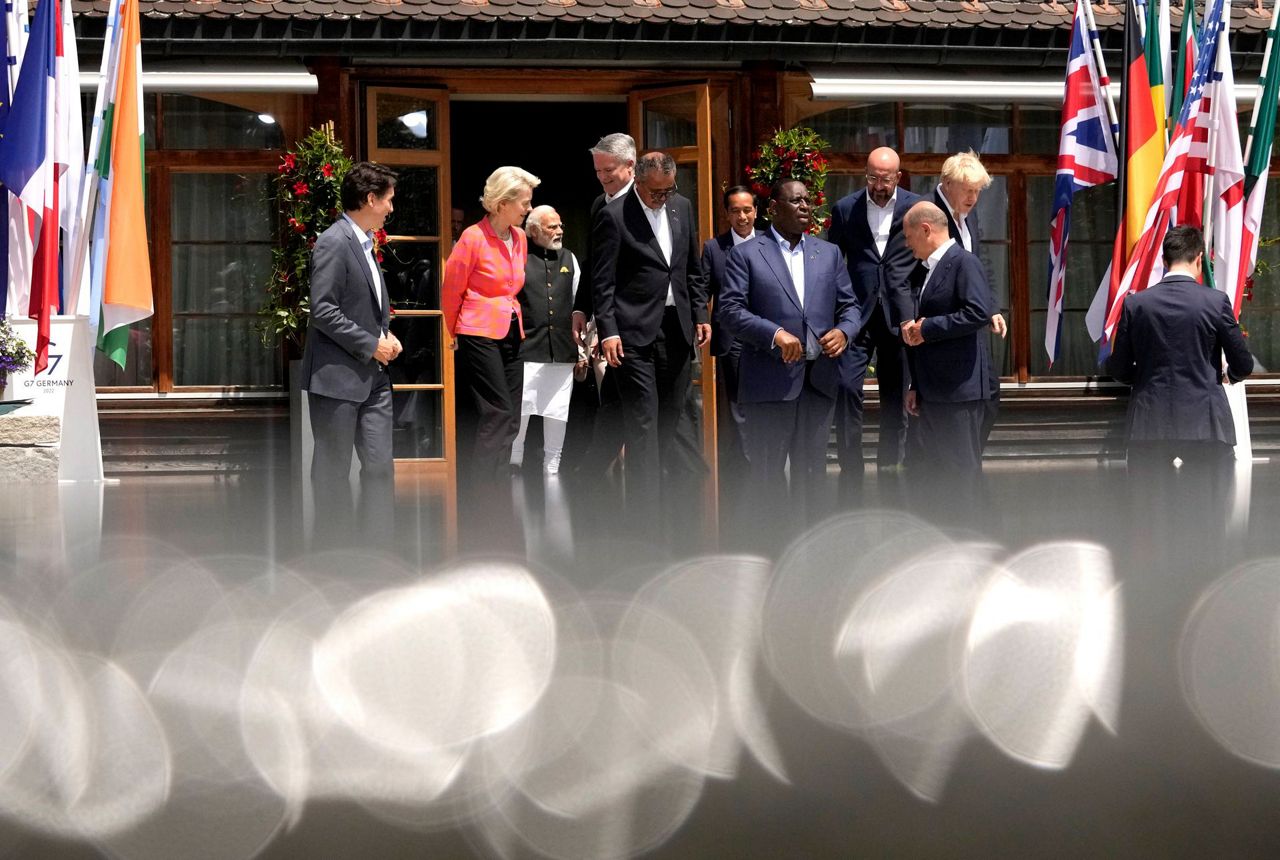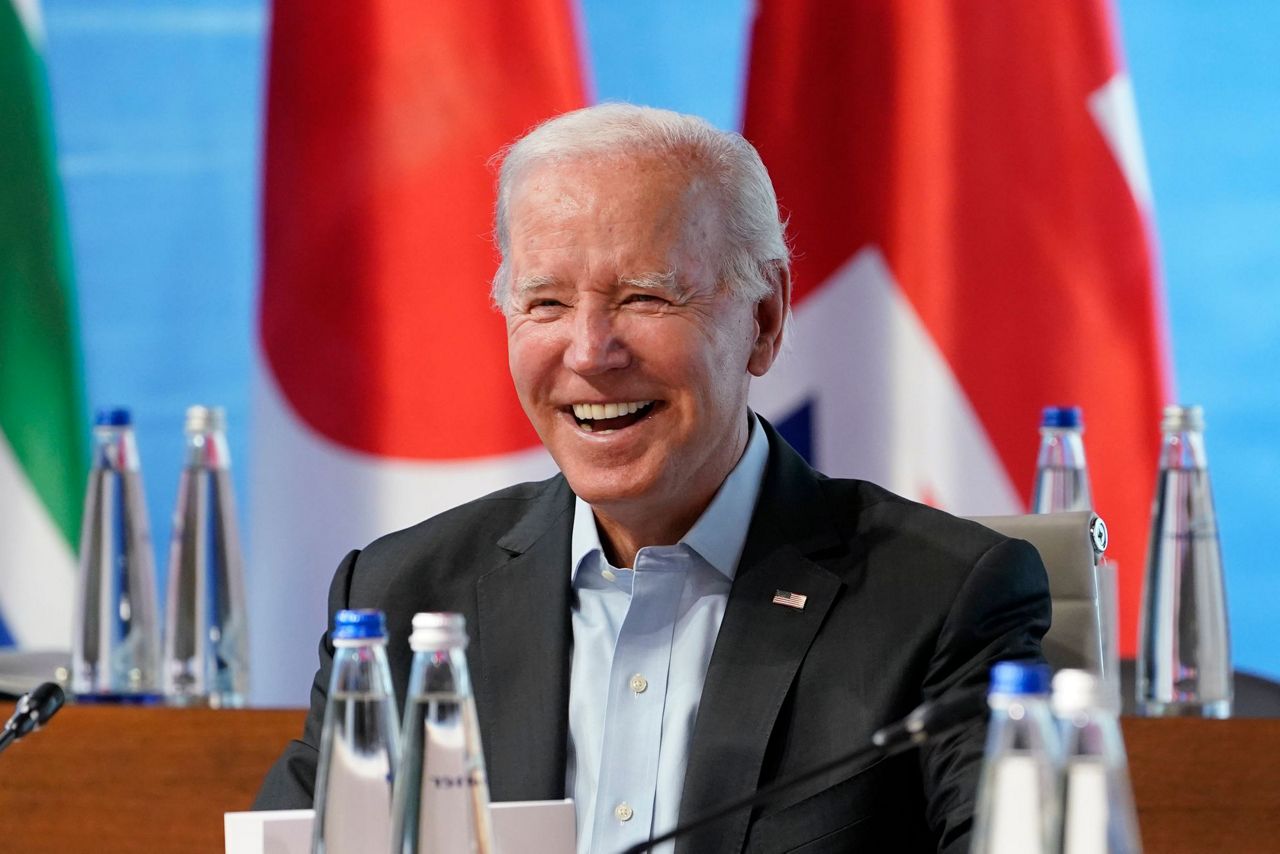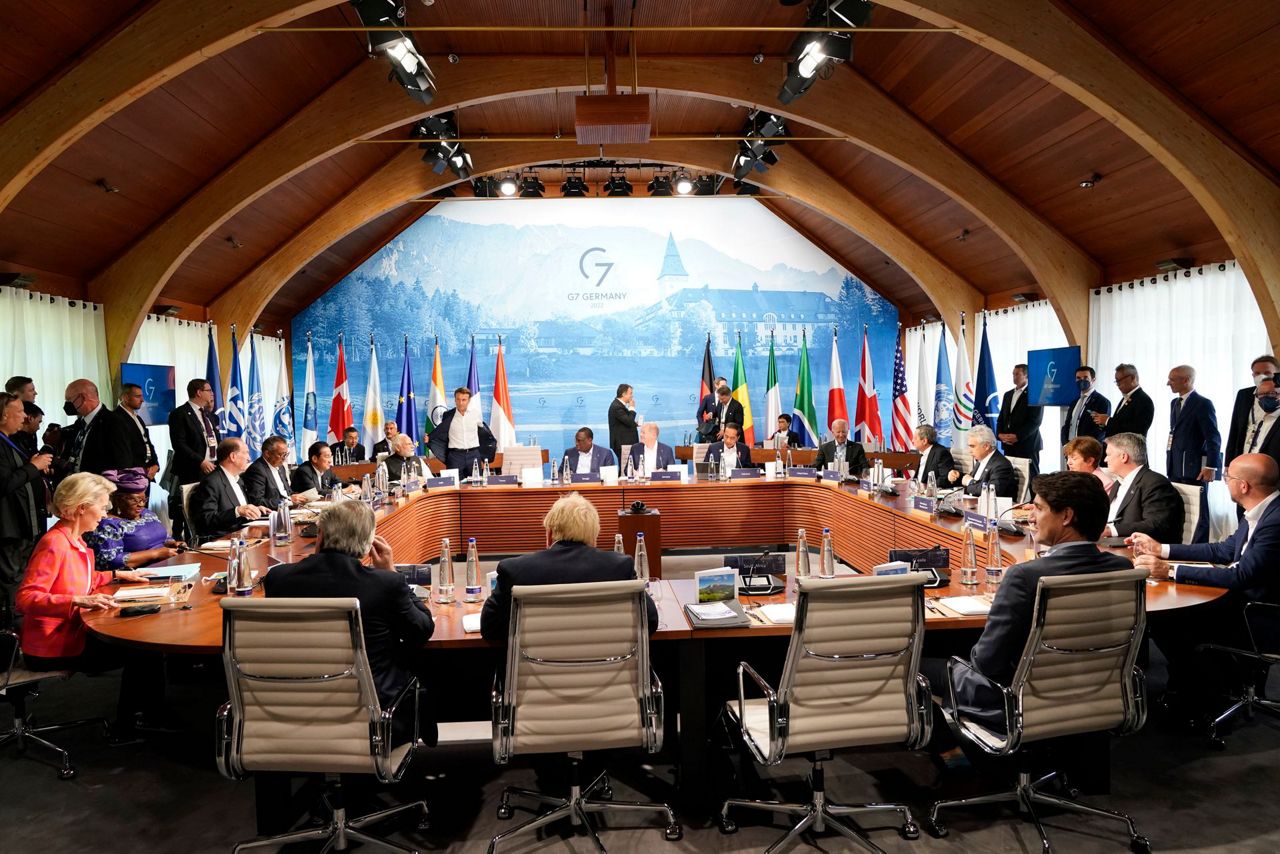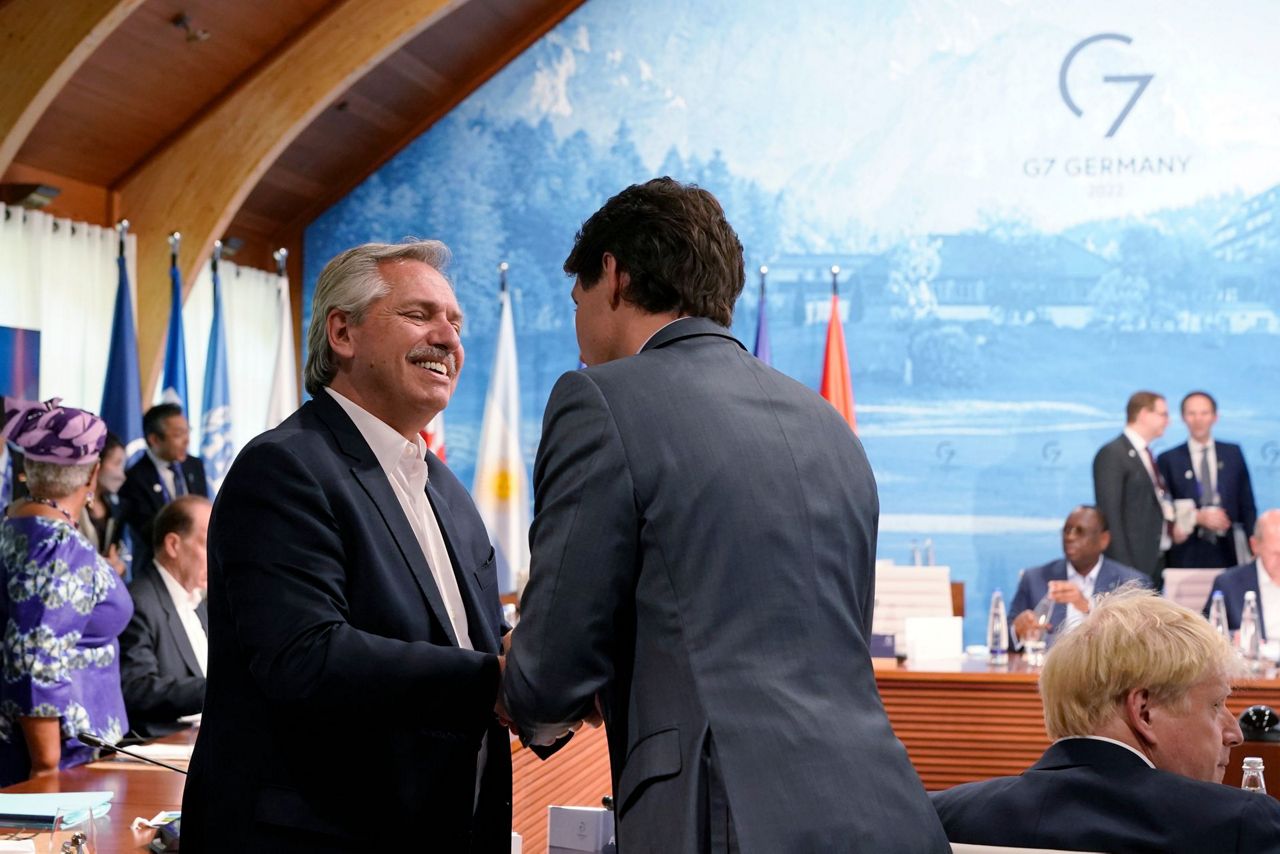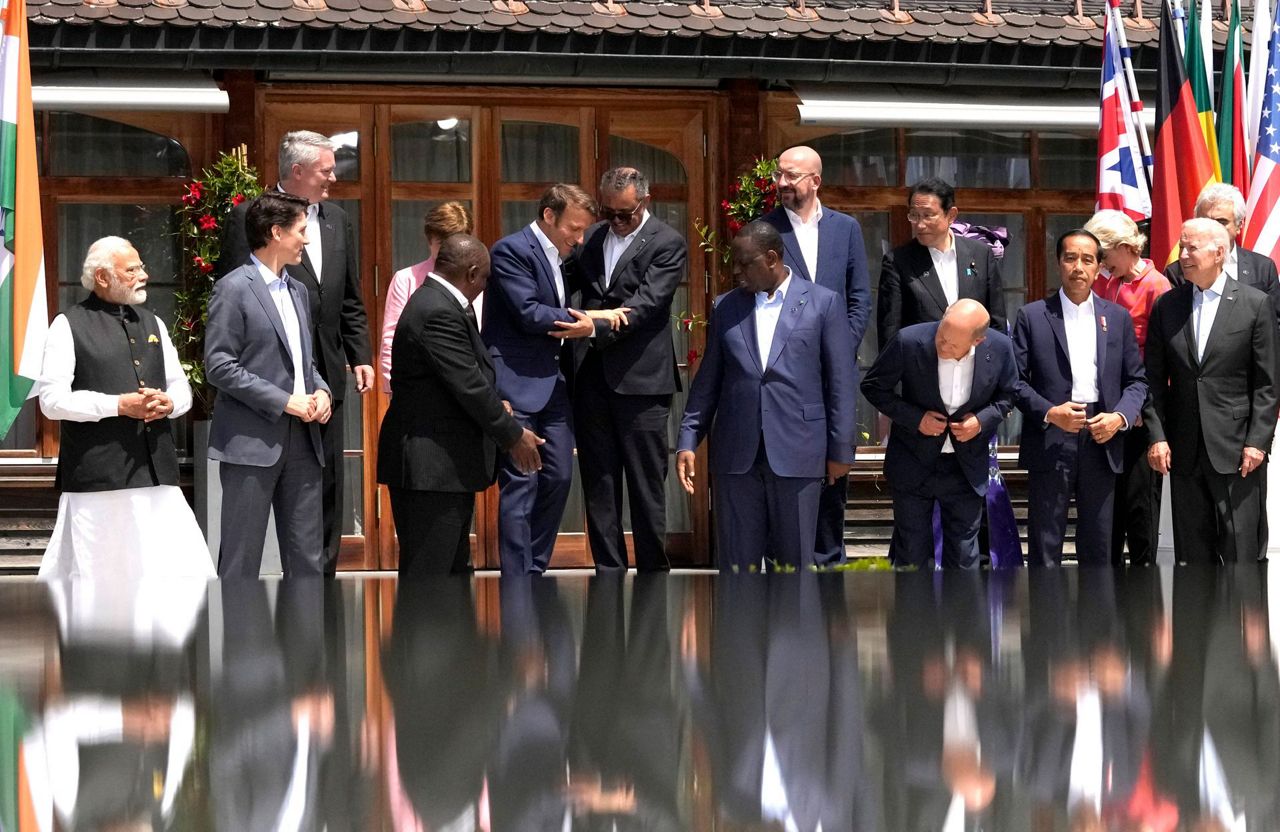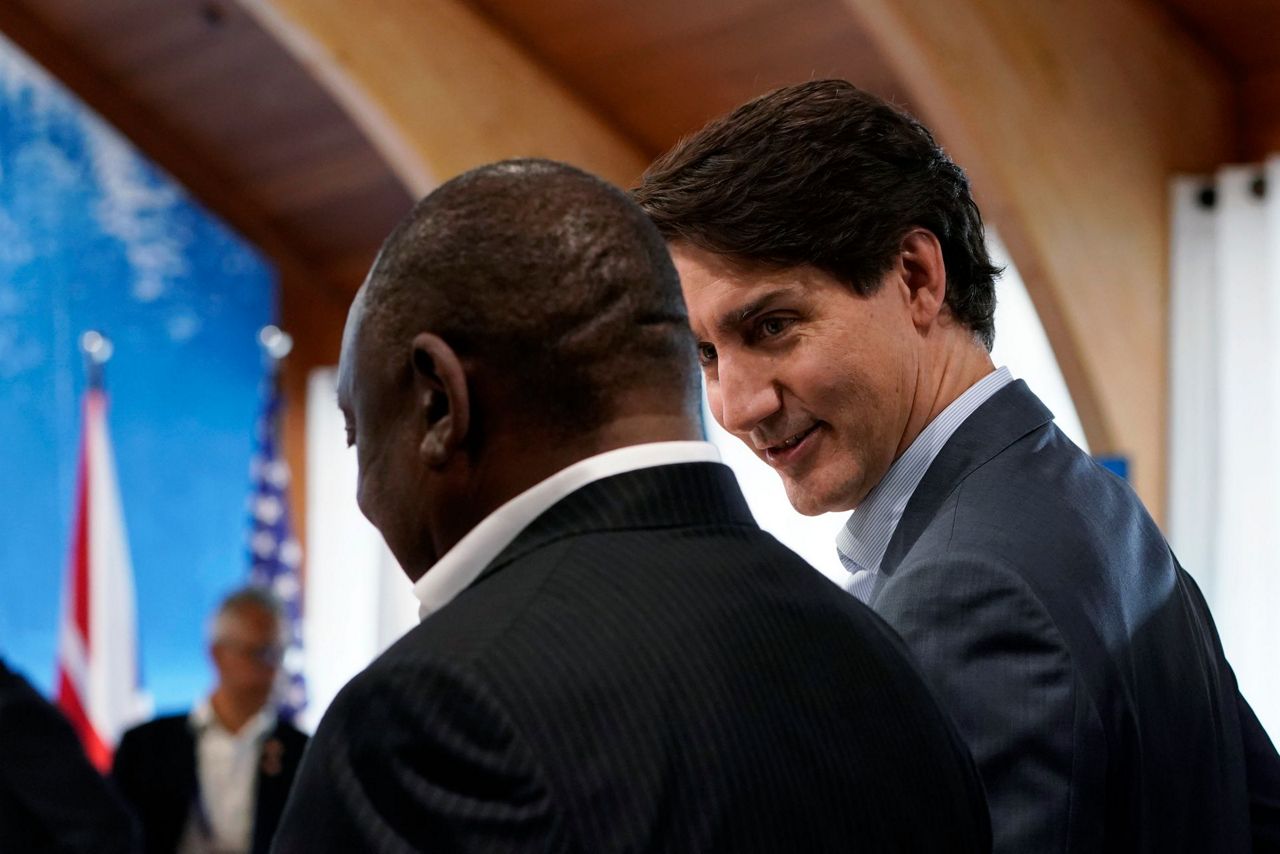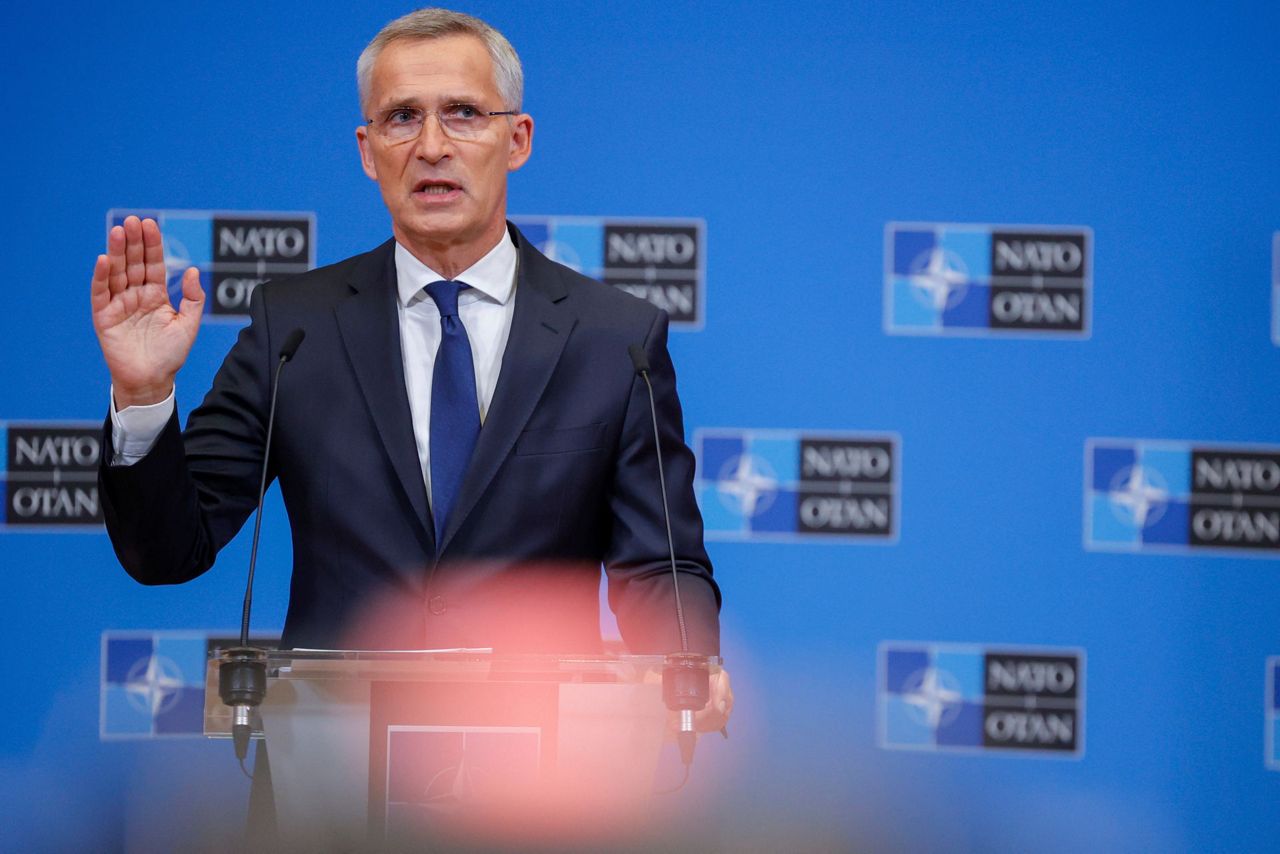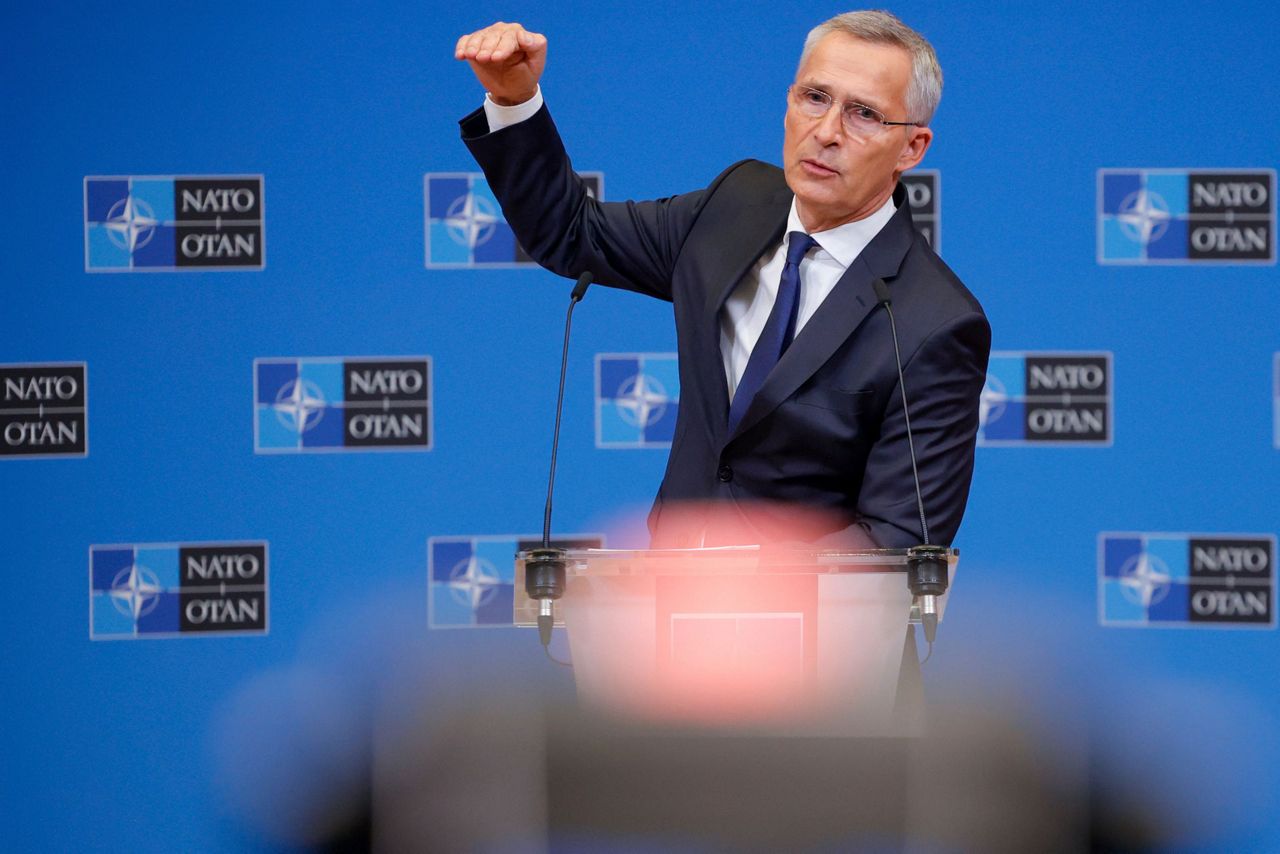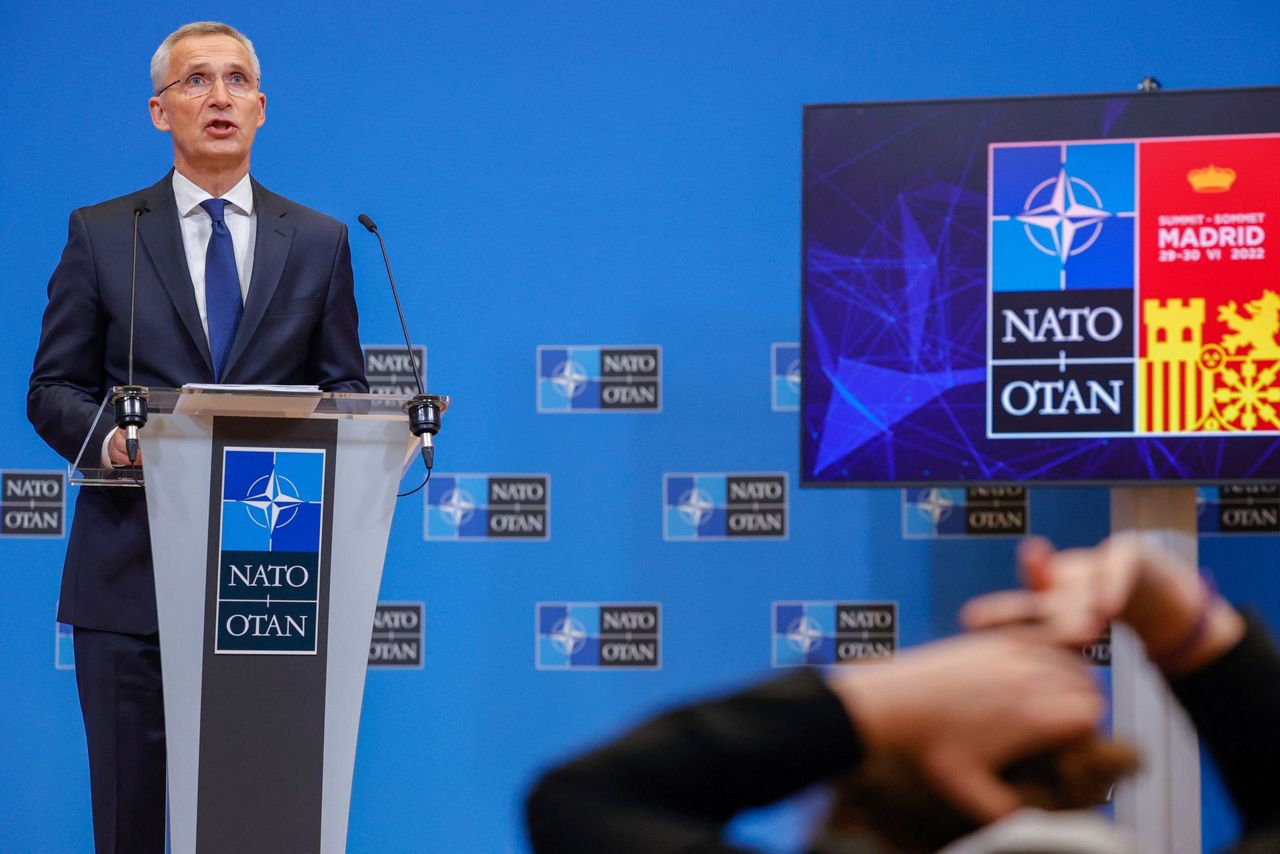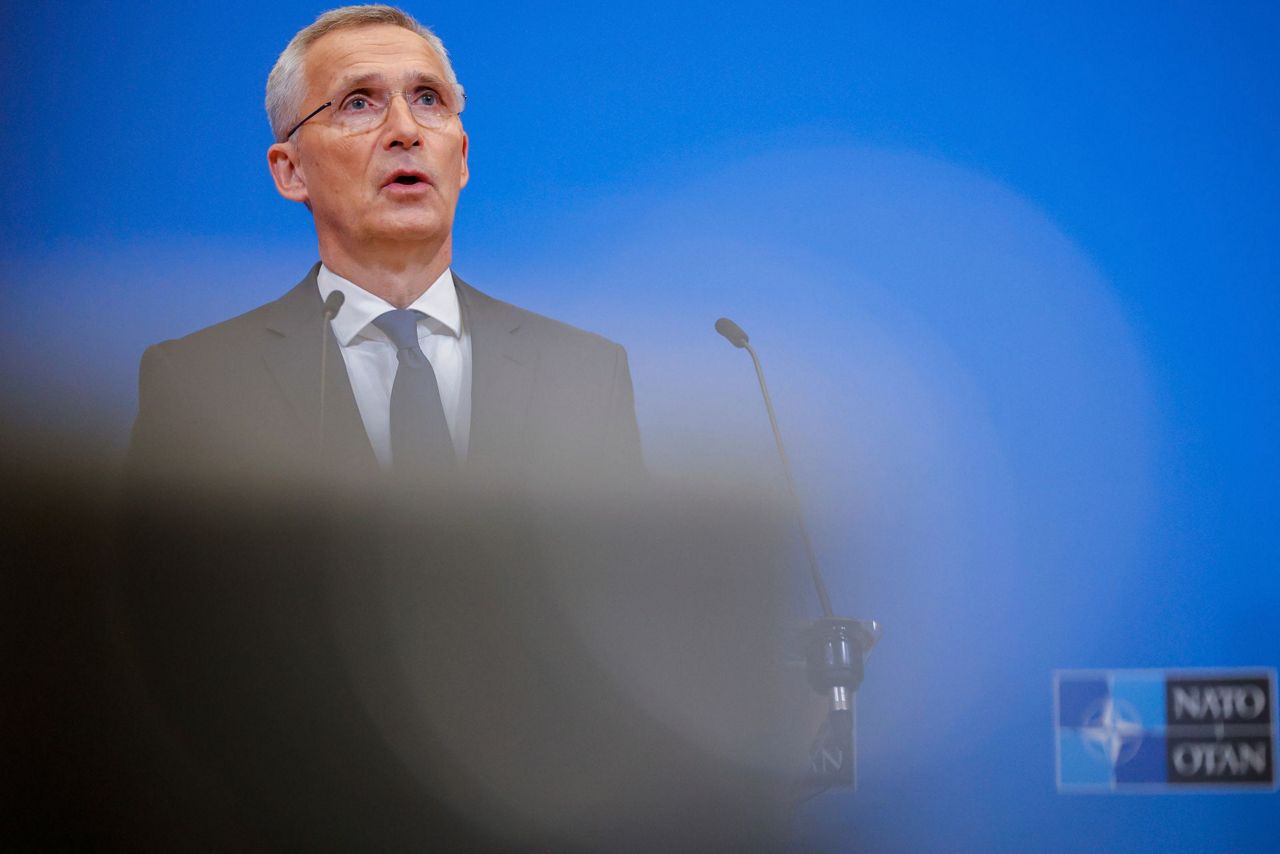ELMAU, Germany (AP) — The Latest on the G-7 summit, the annual meeting of the leading democratic economies, which this year is being held in the Bavarian Alps in Germany; and on the summit of NATO leaders that will start on Tuesday in Madrid:
___
Leaders from the Group of Seven major economies and five key developing nations pledged Monday to work together to curb climate change while ensuring energy security for their citizens.
In a joint statement released by Germany, which chairs the G-7 this year, the leaders emphasized the need to accelerate a “clean and just energy transition” that would see an end to the burning of fossil fuels without causing a sharp rise in unemployment.
The statement cited an agreement last year between several rich nations and South Africa that would see the country receive help to end its heavy reliance on coal and ramp up the use of renewable energy. Similar partnerships are being discussed with other developing countries.
The statement’s cautious language — referring to the need to “phase down unabated coal” — reflects concerns particularly by India, one of the signatories, which also relies strongly on this heavily polluting fossil fuel.
Leaders also tentatively endorsed the idea of a global “climate club.” The notion, which is being championed by German Chancellor Olaf Scholz at the G-7 summit in the Alpine resort of Elmau, would see countries that agree on ambitious pollution targets spared from climate-related trade tariffs.
___
KEY DEVELOPMENTS:
— G-7 leaders to commit to Ukraine, US sending anti-air system
— Tale of 2 summits: ‘America’s back’ to America’s backsliding
— EXPLAINER: G7 provides forum for like-minded democracies
___
OTHER DEVELOPMENTS:
A small group of demonstrators has been allowed to protest within sight of the Group of Seven summit venue — though not exactly close.
German authorities agreed to have police cars take 50 protesters through the high-security cordon to a site 500 meters (about 550 yards) from the luxury Schloss Elmau hotel. Courts rejected pleas by organizers to be allowed 200 meters (some 220 yards) closer.
At the site in a meadow in the Elmau valley, the protesters unrolled banners calling for “active resistance against the danger of a world war” and “climate protection instead of armament,” among other things.
Monday’s protest took place as the G-7 and guests from five major democratic emerging economies — India, Indonesia, Senegal, South Africa and Argentina — were discussing climate change among other issues.
___
The U.S. is closely monitoring diplomacy between Turkey and Sweden and Finland as they seek to join NATO with hopes that it will create “positive momentum” toward accepting them into the alliance.
National Security Adviser Jake Sullivan says President Joe Biden does not yet have plans to meet directly with Turkish President Recep Tayyip Erdoğan, who has expressed concerns over their accession into NATO because of their stance on Kurdish rebel groups that Turkey considers terrorists.
Referring to talks between the countries, along with NATO Secretary General Jens Stoltenberg, set for Tuesday in Brussels on the eve of the alliance’s summit in Madrid, Sullivan says, “Let’s see how the next 24 hours unfold.”
“ The President is following this very closely,” Sullivan added of Biden. “His team is working it with the Finns, Swedes, and Turks, and I’m on the phone daily with my counterparts from all three countries.”
He said he could not say all the issues between the countries would be worked out in time for the summit, but said, “we’re going to try and resolve as many of them as possible so that Madrid gives a boost to their candidacies, even if there remains some concerns on the part of Turkey that need to be worked out.”
___
President Joe Biden and European Commission President Ursula von der Leyen have promised to do more to rein in climate-wrecking natural gas leaks as European imports of American liquefied natural gas soar as a result of Russia’s war on Ukraine.
U.S. LNG exports to Europe have nearly tripled since Russia invaded Ukraine in February. Overall LNG exports to Europe have risen by 75% since last year. That’s all as a result of Western boycotts and Russian cutoffs of Russian natural gas to Europe in the fallout from the war.
Climate groups warn the LNG boom threatens crucial efforts by the United States and Europe to quickly cut fossil fuel emissions to stave off some of the worst scenarios of global warming. Natural gas is largely methane, which is a potent greenhouse gas and major contributor to climate change.
In a joint statement, Biden and von der Leyen pledged to step up US-EU cooperation to reduce methane emissions, work to bring their LNG trade under standardized monitoring, reporting and verification for methane leaks, and work to reduce natural gas flaring and venting and other methane releases as part of their LNG use.
___
Ukrainian President Volodymyr Zelenskyy has thanked G7 states for their support of Ukraine, while calling for further sanctions against Russia.
“Ukraine feels the support of the G7 states. Thank you for the defense and financial assistance,” Zelenskyy said on Telegram.
He also called on G7 allies to cap the price of Russian oil exports, describing the potential move as an increase in sanctions pressure on the Kremlin.
In a separate statement Monday, Ukraine’s presidential press service said Zelenskyy had asked G7 leaders for air missile defense systems, as Russia intensifies rocket attacks on cities.
___
NATO Secretary General Jens Stoltenberg says the alliance wants to increase the number of its rapid reaction forces from the current 40,000 troops to 300,000.
Speaking at a press conference Monday ahead of a NATO summit later this week in Madrid, Stoltenberg said allies will agree to deliver further military support to Ukraine when they convene in Spain.
Stoltenberg said NATO members will agree on a “strengthened assistance package” including secure communication and anti-drone systems.
Over the long term, Stoltenberg said allies aim to help Ukraine transition from Soviet-era armaments to modern NATO equipment.
___
The Group of Seven leaders have pledged to continue supporting Ukraine “for as long as it takes.”
In a joint statement Monday after a video link session with Ukrainian President Volodymyr Zelenskyy, the leaders underlined their “unwavering commitment to support the government and people of Ukraine in their courageous defence of their country’s sovereignty and territorial integrity.”
They said that “it is up to Ukraine to decide on a future peace settlement, free from external pressure or influence.”
The leaders of the world’s leading democratic industrial powers pledged that “we will continue to provide financial, humanitarian, military and diplomatic support and stand with Ukraine for as long as it takes.”
They would continue exploring “new ways to isolate Russia from participating in the global market” and are “determined to reduce Russia’s revenues, including from gold.”
The leaders added that Russia must abide by international commitments including bans on the use of chemical, biological or nuclear weapons, and voiced “serious concern” about Russia’s announcement that it would send a nuclear-capable missile system to close ally Belarus.
____
A top French diplomat says Ukrainian President Volodymyr Zelenskyy told the Group of Seven leaders that this isn't the time for negotiations with Russia because he needs to be in stronger position first.
The diplomat said Zelenskyy, who spoke by video link to a G-7 session, told the group that “he will negotiate when he will be in a position to do so.” He was speaking on condition of anonymity in line with the French presidency’s customary practices.
“His goal is to end the war as quickly as possible and to get out of it in the best possible position, so that he can negotiate from a position of strength,” the diplomat said, adding that Zelenskyy told the G-7 he needs economic, financial and military support.
French President Emmanuel Macron said that “nothing regarding Ukraine will be decided without Ukraine” and it’s up to Zelenskyy to decide when he wants to engage in negotiations with Russia, according to the diplomat.
— By Sylvie Corbet in Paris
___
The German government insists its plans to tap new sources of natural gas don’t undermine the country’s ambitious climate goals.
German Chancellor Olaf Scholz is promoting the idea of a ‘climate club’ at a meeting Monday with fellow leaders from the Group of Seven major economies and key developing nations such as Indonesia, South Africa and Argentina.
Speaking ahead of the talks, Scholz told German public broadcaster ZDF that the club would bring together those countries “that are willing to become CO2-neutral very quickly by mid-century.”
The idea, which is still being fleshed out, would see members set common standards for curbing greenhouse gas emissions and agree not to impose climate-related tariffs on each others’ imports.
Scholz described his own country’s target of reducing emissions to net zero by 2045 - the earliest of any major industrial nation - as “very ambitious.” But his government has been criticized by climate campaigners for seeking new suppliers of natural gas to replace the shortfall from Russia.
Government spokesman Wolfgang Buechner said new energy agreements being forged with Senegal, which including developing a natural gas field, were “in accordance” with Germany’s emissions targets and the 2015 Paris climate accord. But Buechner declined to comment on reports that Germany was pressing other nations to soften existing agreements on reducing fossil fuel investments, saying talks at the G-7 summit in the Alpine resort of Elmau were ongoing.
___
German Chancellor Olaf Scholz has welcomed the leaders of five top emerging democratic economies and of major international organizations to the Group of Seven summit.
G-7 leaders plan to discuss a range of key issues with their guests, Prime Minister Narendra Modi of India, and Presidents Macky Sall of Senegal, Joko Widodo of Indonesia, Cyril Ramaphosa of South Africa, and Alberto Fernández of Argentina. Those issues include climate change, energy, health and the COVID-19 pandemic, food security and gender equality.
They’re being joined Monday by the heads of the World Bank, the International Monetary Fund, the World Trade Organization, the World Health Organization and others.
Indonesia this year holds the presidency of the larger Group of 20 of major economies, which also includes Russia and China. That group faces a potentially awkward summit in Bali in November, in light of the possibility that Russian President Vladimir Putin could attend.
____
Finnish President Sauli Niinisto says that he and the Swedish prime minister will meet with Turkish President Recep Tayyip Erdogan and the NATO secretary-general on the sidelines of this week’s NATO summit in the Spanish capital.
Finland and Sweden have applied to join the 30-member alliance in the wake of Russia’s invasion of Ukraine. But NATO member Turkey has so far blocked their applications, citing what it considers to be the two countries’ soft approach on organizations Ankara considers as terrorist, such as the Kurdistan Workers’ Party, or PKK.
Turkey is demanding that Sweden and Finland grant extradition requests for individuals it claims are PKK members or are linked to a failed 2016 coup. Ankara also wants assurances that restrictions on arms sales that both countries imposed over its 2019 military incursion into northern Syria will be lifted.
Turkey’s presidential spokesman Ibrahim Kalin told broadcaster Haberturk TV that “our attendance at this summit does not mean we will take a step back from our position.”
Ukrainian President Volodymyr Zelenskyy has joined the Group of Seven leaders by video link at their summit in the Bavarian Alps.
Zelenskyy could be seen on a television screen next to the round table where the leaders sat Monday at the secluded Schloss Elmau luxury hotel. His address wasn’t being shown to the public.
The G-7 leaders are committing themselves to supporting Ukraine for the long haul at their summit, with both immediate help and long-term rebuilding on the agenda.
___
German Chancellor Olaf Scholz says ahead of a session with Ukrainian President Volodymyr Zelenskyy that the G-7 countries’ policies on Ukraine are “very much aligned,” and that they see the need to be both tough and cautions.
Scholz said after meeting Canadian Prime Minister Justin Trudeau on Monday that “we are taking tough decisions, that we are also cautious, that we will help ... Ukraine as much as possible but that we also avoid that there will be a big conflict between Russia and NATO.”
He added that “this is what is of essence -- to be tough and thinking about the necessities of the time we are living in.”
The G-7 leaders are to confer by video link Monday morning with Zelenskyy.
___
The Group of Seven economic powers are set to announce an agreement to pursue a price cap on Russian oil, aiming to curb Moscow’s energy revenues, a U.S. official said Monday. The move is part of a joint effort of support for Ukraine that includes raising tariffs on Russian goods and imposing new sanctions on hundreds of Russian officials and entities supporting the four month long war.
Leaders were finalizing the deal to seek a price cap during their three-day summit in the German Alps. The details of how a price cap would work, as well as its impact on the Russian economy, were to be resolved by the G-7 finance ministers in the coming weeks and months. The largest democratic economies will also commit to raising tariffs on Russian imports to their countries, with the U.S. announcing new tariffs on 570 categories of goods, as well as use of sanctions to target Russia’s defense supply chains that support its effort to rearm during the war.
The senior administration official spoke on the condition of anonymity to preview the announcements from the G-7 leaders’ summit, where they are set to confer by video link with Ukrainian President Volodymyr Zelenskyy.
— By Zeke Miller in Elmau, Germany
___
German Chancellor Olaf Scholz says the West has no intention to “torpedo” the Group of 20 — the group of major economies that also includes Russia.
This year’s G-20 summit is due to take place in Indonesia in November. There are questions over whether Western leaders will sit down with Russian President Vladimir Putin.
Scholz, who is hosting this week’s summit of the smaller Group of Seven industrial powers, on Monday also is hosting leaders from five major emerging democratic economies — India, Indonesia, Senegal, South Africa and Argentina.
So far, they don’t all see eye-to-eye with the G-7 nations on the war in Ukraine or sanctions. Scholz told Germany’s ZDF television that “it’s all the more important that we discuss (the matter) with each other.”
Scholz told Germany’s ZDF television: “We must not walk into the trap Putin sets of asserting that the world is divided into the global West — the G-7 and its friends in the north — and all the rest. That’s not true. There are democracies all over the world and they have very similar perspectives.”
Scholz didn’t give an explicit commitment to turn up to the G-20 summit regardless of whether Putin attends, but stressed the group’s importance.
He said: “There is a common conviction … that we don’t want to torpedo the G-20.”
___
President Joe Biden is set to announce that the U.S. is providing an advanced surface-to-air missile system to Ukraine, as well as additional artillery support, according to a person familiar with the matter, in the latest assistance meant to help the country defend against Russia’s four-month invasion.
The U.S. is purchasing NASAMS, a Norwegian-developed anti-aircraft system, to provide medium- to long-range defense, according to the person, who spoke on the condition of anonymity. NASAMS is the same system used by the U.S. to protect the sensitive airspace around the White House and U.S. Capitol in Washington.
Additional aid includes more ammunition for Ukrainian artillery, as well as counter-battery radars, to support its efforts against the Russian assault in the Donbas, the person said.
The announcement comes as Biden is huddling with allies this week on supporting Ukraine in meetings at the Group of Seven advanced economies summit in Germany and NATO leaders’ annual gathering in Madrid.
— By Zeke Miller in Elmau, Germany
___
One year ago, Joe Biden strode into his first Group of Seven summit as president and confidently told the closest U.S. allies that “America is Back.”
Now, there are worries that America is backsliding. As Biden meets this week with the heads of G-7 leading democratic economies in the Bavarian Alps, he brings with him the baggage of domestic turmoil.
The U.S. is grappling with political unrest, shocking mass shootings and the U.S. Supreme Court’s decision to end constitutional protections for abortion.
Biden says other world leaders at the summit haven’t been asking him about the abortion ruling. But the domestic unrest is no doubt troubling to his European allies.
___
Follow AP’s coverage of the G-7 summit: https://apnews.com/hub/g-7-summit
Copyright 2022 The Associated Press. All rights reserved. This material may not be published, broadcast, rewritten or redistributed without permission.



